Category: NYF News
NYF Celebrates International Day of the Girl Child
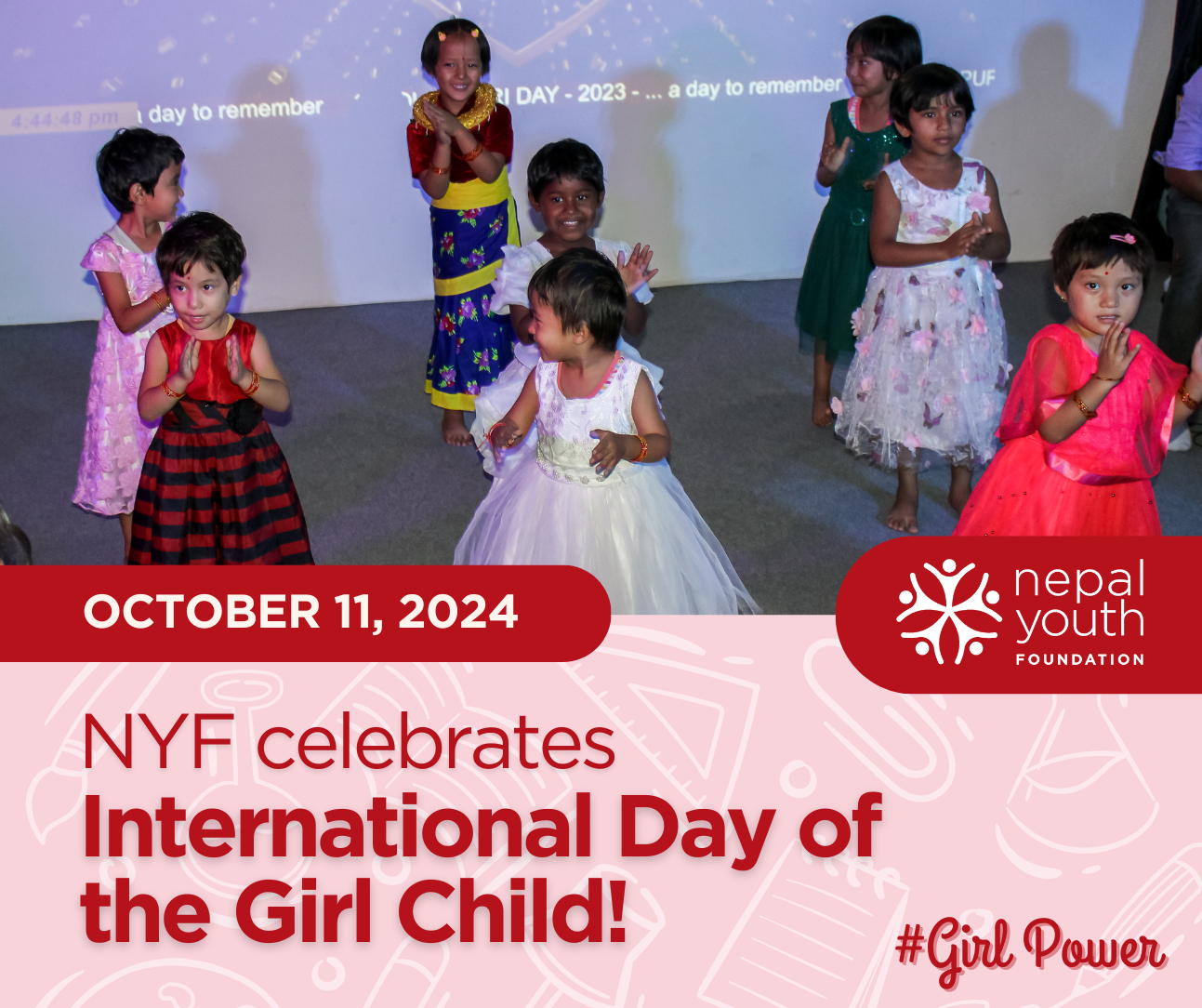
International Day of the Girl Child
In 2012, the United Nations declared October 11th as International Day of the Girl Child. This powerful global movement champions the rights and potential of girls everywhere. This day was born from the urgent call for gender equality and is driven by the unwavering voices of advocates worldwide. It highlights the unique challenges girls face—like limited access to education, early marriage, and systemic discrimination—while celebrating their resilience, strength, and accomplishments. Above all, it’s a call to action, reminding us that every girl deserves the opportunity to thrive, lead, and create a brighter future.
This year’s theme is “Girls’ Vision for the Future.” It underscores the boundless possibilities that arise when girls are empowered to dream big, assume leadership, and break barriers.
Nepal Youth Foundation paves the way for future girl leaders!
At the heart of Nepal Youth Foundation (NYF) lies a profound commitment to empowering girls and young women. For over three decades, we’ve been helping them reclaim their freedom, advocate for their rights, and shape their destinies. This is illustrated by one of our most transformative initiatives, the Empowering Freed Kamlaris program. This program has touched the lives of thousands of young women from the Tharu community, who once faced the oppressive chains of indentured servitude. Through education, self-advocacy, and community mobilization, these women have become powerful agents of change—leading a historic movement that brought an end to this exploitative practice in Nepal.
We continue to work side by side with these women to provide vocational training, higher education, and ongoing community support. Their courage and resilience remind us that when young women are empowered to stand up for their rights, entire societies are transformed. As we celebrate International Day of the Girl Child, we reflect on this legacy of courage and resilience.

Building Futures at Olgapuri Children’s Home
Olgapuri Children’s Home is NYF’s beautiful, permanent home for children whose parents are unable to care for them. Olgapuri is more than just a home—it’s a launchpad for dreams. Here, girls are equipped with the tools and confidence they need to envision their futures and make them a reality.
Earlier this year, our girls at Olgapuri showcased their talent and determination during an annual Carnival Days event. Competing alongside children from other group homes, they excelled in sports, chess, and essay writing. The highlight? Our girls’ futsal team clinched first place! Certainly, their victory is a testament to their hard work, spirit, and belief in themselves. On International Day of the Girl Child, we honor the girls at Olgapuri. They are dreaming big, leading with confidence, and building a brighter future for themselves and their communities.
Check out our champs (plus two proud little brothers) in the group photo!
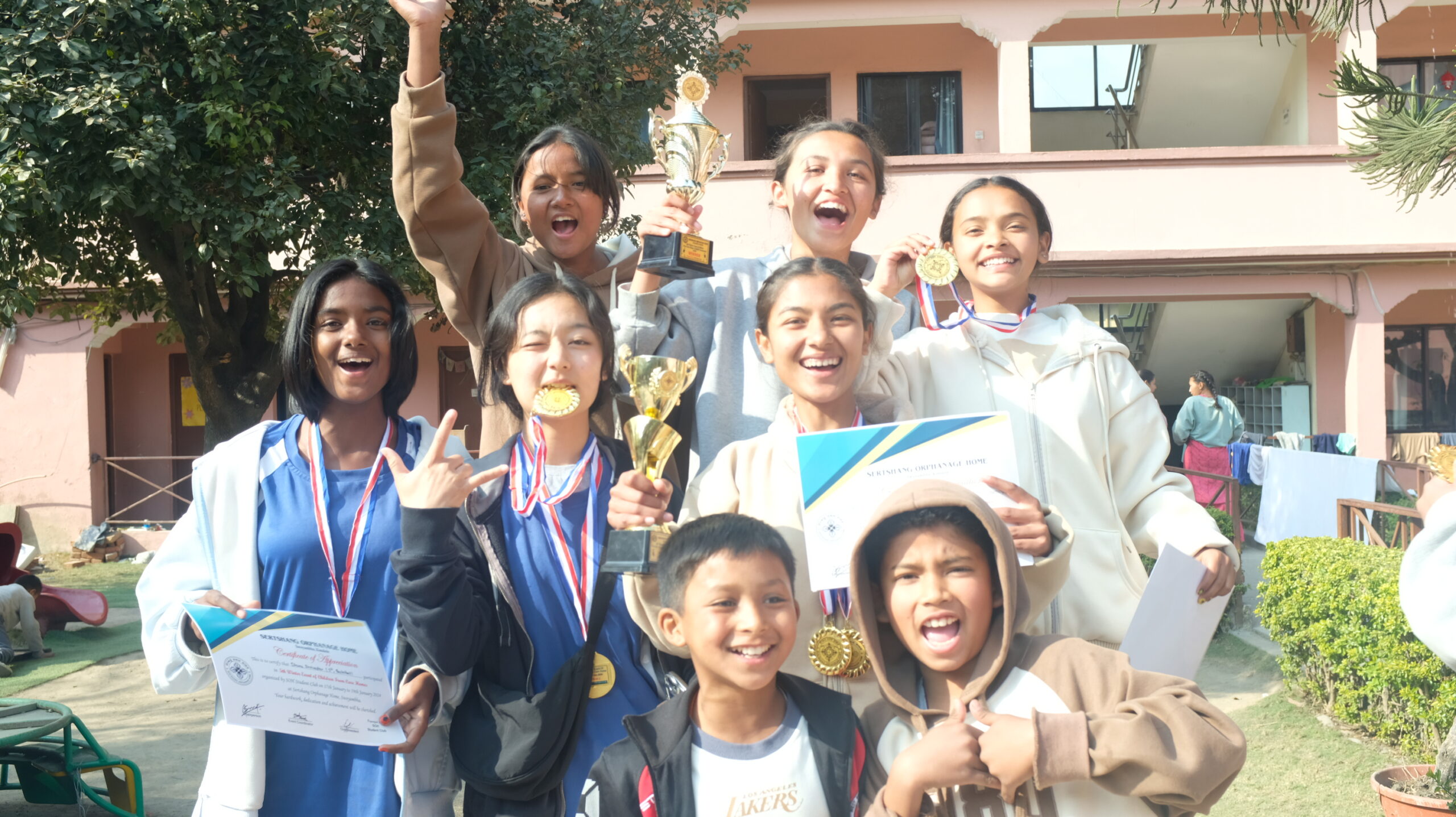
Healing & Hope at Ankur Counseling Center
Ankur is the Sanskrit word for “flower bud,” “sapling,” or “sprout.” It is also the name for Nepal’s first counseling center for children—NYF’s Ankur Counseling Center.
Transformation often begins from within. At Ankur, we witness the power of healing every day. One of our cherished counselors recently shared the journey of a young girl who arrived at the center struggling with loneliness and low self-esteem. Yet, even in her hardest moments, she carried the hope of becoming the best version of herself. Through weekly therapy sessions, she began to embrace self-compassion, gain confidence, and rebuild trust in herself and the world. As a result, the girl, once withdrawn, now excels academically. Even more, she formed beautiful friendships. Her story is a beautiful reminder that when given a safe space and strong support system, girls can reclaim their strength and shape their futures with courage.
“My favorite part of the job is witnessing the healing process of the children and youth,” the counselor reflected. “I love being the safe space where they can explore their fears and hopes, and I cherish being part of their journey toward confidence and compassion.” -Ankur Counseling Center Staff Member
Protecting Girls Through Kinship Care
Kinship Care is one of NYF’s two main “shelter” programs, the other being Olgapuri Children’s Village. NYF’s Kinship Care program keeps families together by providing small stipends to loving, stable family members to ensure children are safe, well-fed, receiving necessary medical care, and most of all, attending school!
Unfortunately, in some communities around Nepal, early marriage still threatens girls’ futures. For instance, in early 2023, NYF’s Kinship Care Program Officer & Technical School Scholarship Officer, Ram Babu Rai, encountered this issue firsthand in a village near his hometown. Ram Babu found that in the Balami community, harmful traditions jeopardized young girls’ education and freedom. As a result, Ram Babu proposed a special scholarship program to protect these girls from early marriage. The initiative currently supports 15 girls at risk, ensuring they stay in school and receive the education they deserve. By collaborating closely with local schools and governments, we hope to expand this program and further protect young lives and reduce school dropouts.
To dive deeper into Ram Babu Rai’s impactful work in child protection and education, check out his staff spotlight.
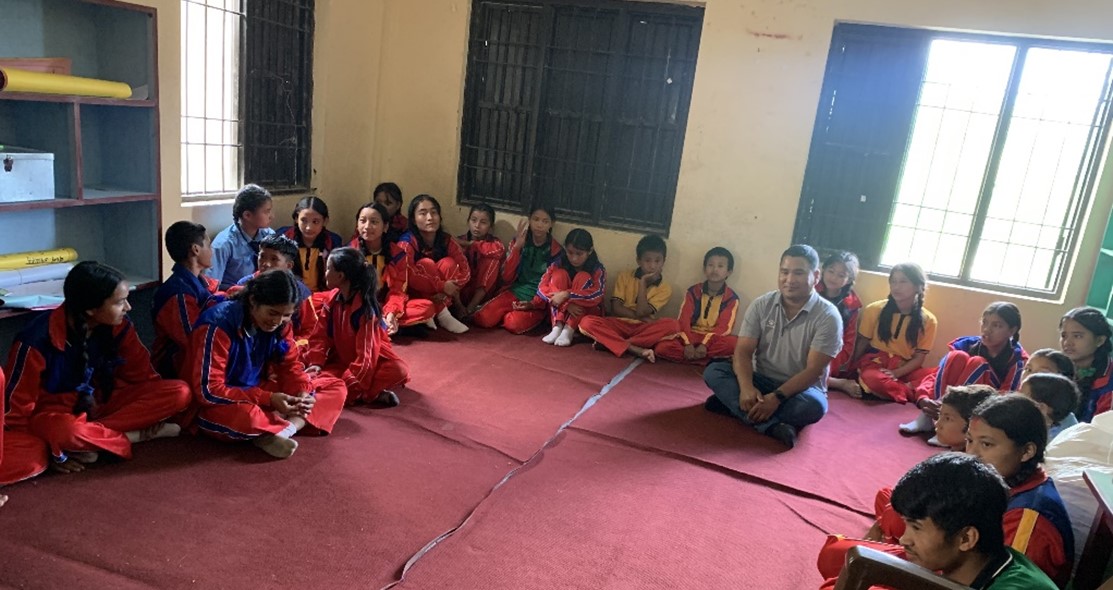
Advocating for Change Through the Caste Equality Project
NYF’s long-term Caste Equality Project is our most ambitious and daring undertaking yet. Our goal is to empower Nepali Dalit communities to access the opportunities and resources they need to build towards the futures they envision for themselves and their children.
Similarly to NYF’s Empowering Freed Kamlaris program, we expect this work to take a generation or more. Our full Caste Equality Project will combine lessons learned across our organizations 30+ year history, providing on-the-ground interventions in Dalit communities. Overall, the challenges confronted by Nepal’s Dalit communities are complex and tightly woven with every aspect of life, from pre-natal care to early nutrition to educational opportunities and much more.
Street Drama Campaigns
To demonstrate, in February 2024, ten girls from Saptari District took center stage, performing a street drama that exposed the harmful effects of child marriage. Drawing from real-life experience like dowry negotiations and forced unions, they sparked vital conversations about gender inequality and child protection.
Among these young activists is Priya*, a 16-year-old who was married at just 14. Priya understands firsthand the devastating effects of early marriage and is determined to protect others from the same fate. “I’m experiencing the repercussions of early marriage myself, so I’m delighted to contribute to its prevention in any way possible,” she shares. Since beginning her advocacy work, Priya has already helped to stop at least one child marriage. Undoubtedly, demonstrating the transformative power of young voices leads to change. As we celebrate International Day of the Girl Child, initiatives like these remind us of the strength, courage, and leadership of girls—working tirelessly to build a more just and equal future for themselves and their communities.
Interested in learning more? More updates are coming out of Saptari District here!
*Name changed to protect the privacy of the individuals we work with.
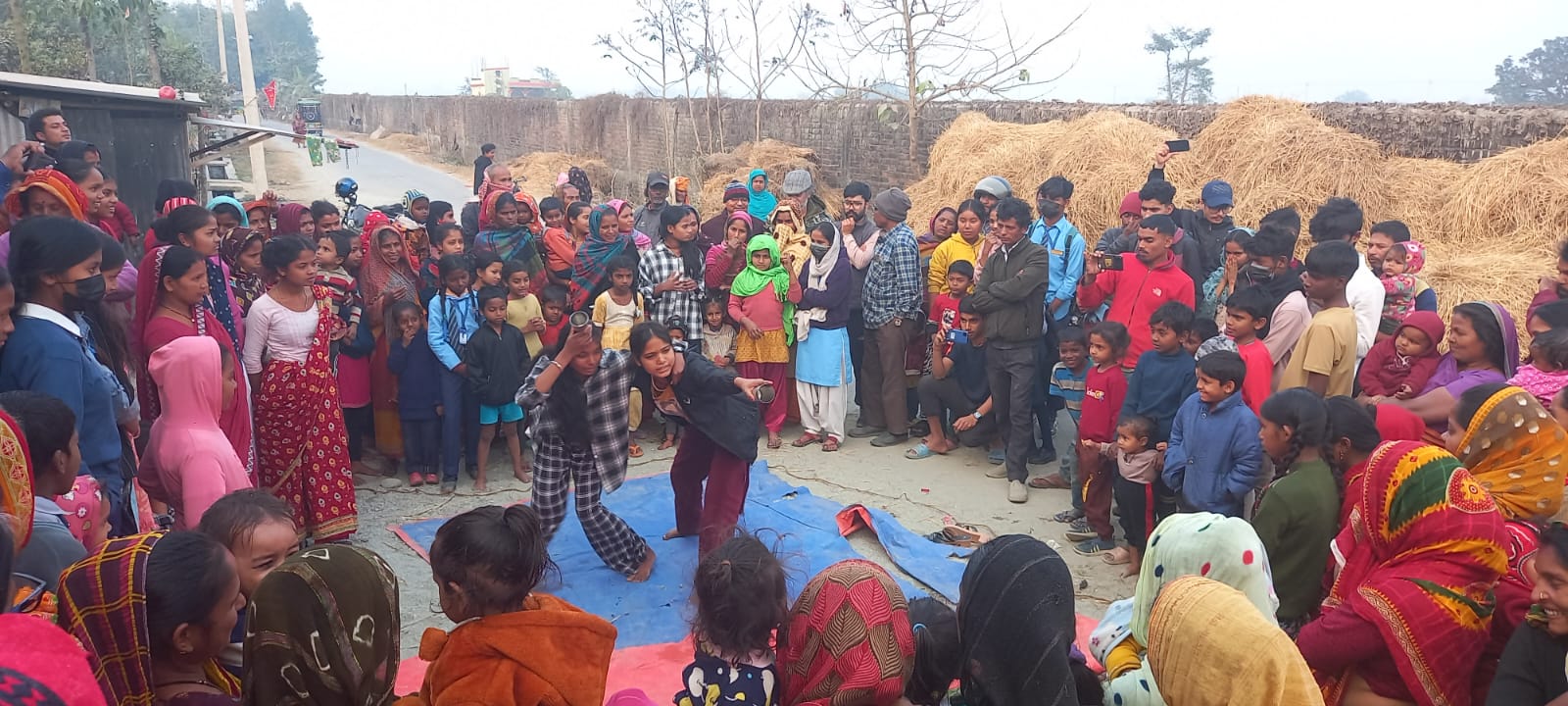
Embracing Limitless Possibilities for Every Girl
At NYF, we believe every girl should feel confident that there are no limits to what she can achieve. Ultimately, whether she dreams of becoming a scientist, an artist, or an entrepreneur, we are committed to breaking down barriers and challenging stereotypes that stand in her way. Above all, this International Day of the Girl Child, we celebrate the limitless potential of every girl. We honor her vision for the future and reaffirm our commitment to supporting her journey.
Together, we can build a world where every girl is not only heard and valued but also empowered to turn her dreams into reality.
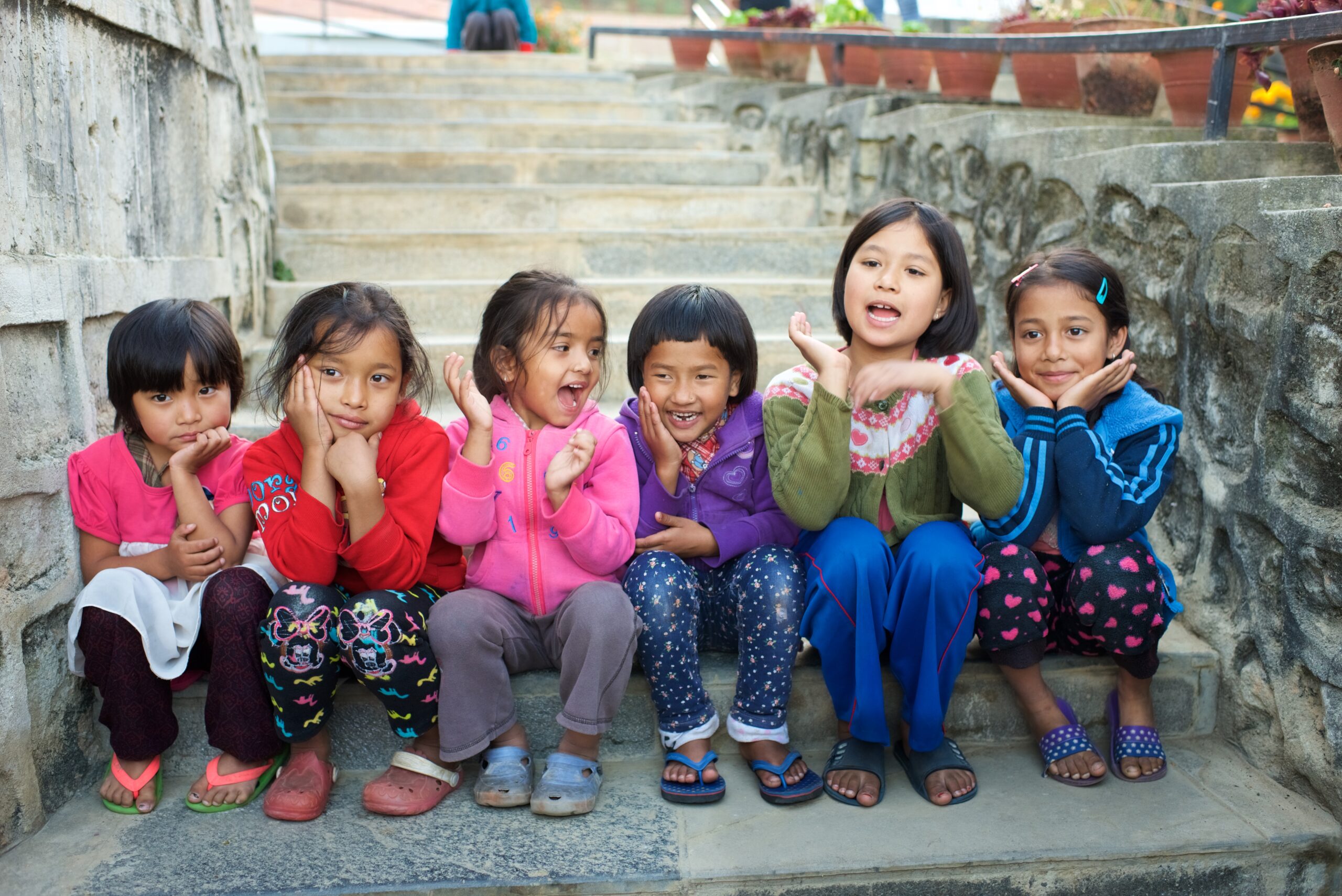
Letter from Som Paneru: Empowering the next generation
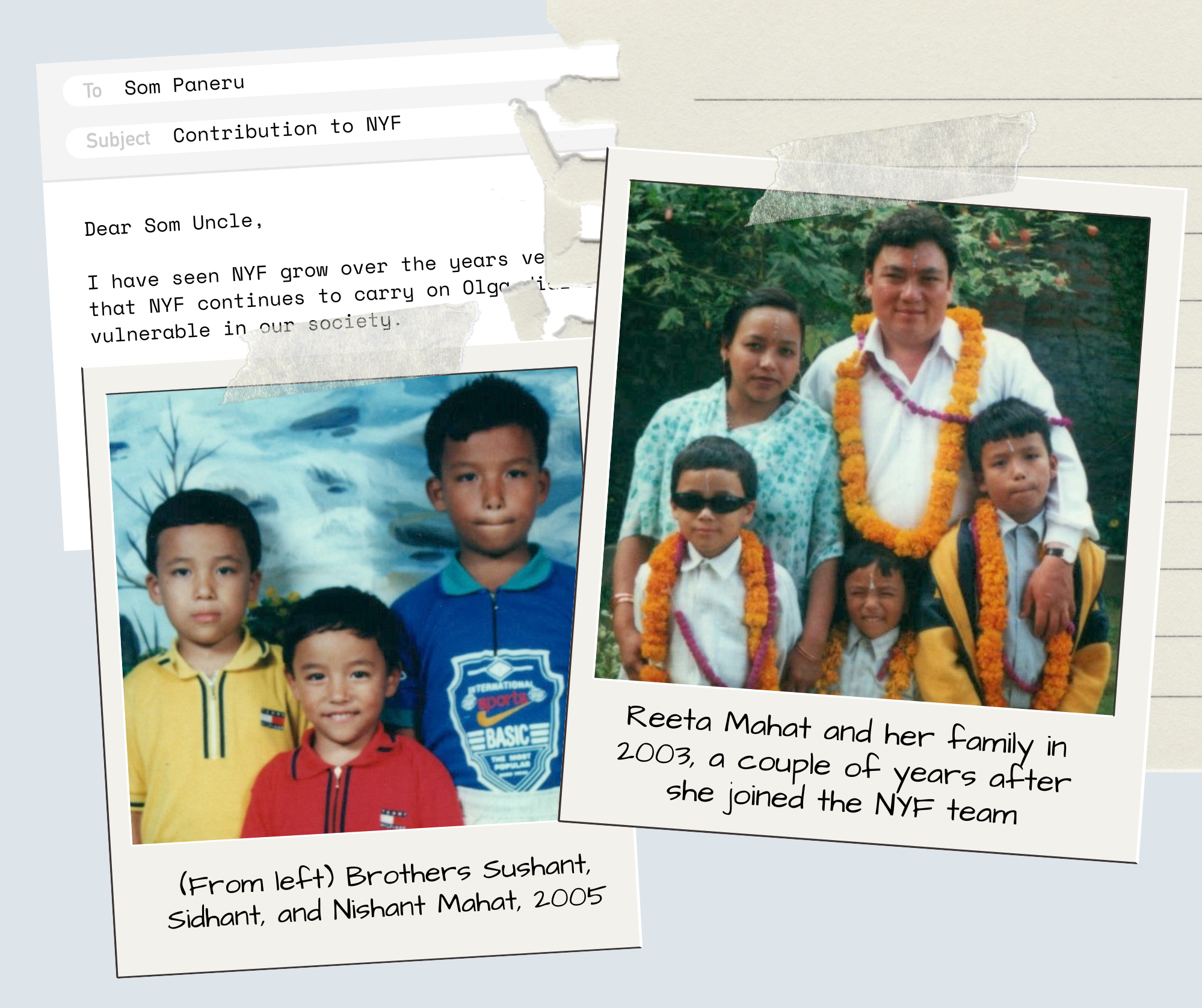
The following is a version of a letter from NYF President Som Paneru. The letter was featured in a mailing in September 2024, sent to select NYF friends in North America. If you’d like to receive stories like this in the mail, please let us know. We hope you enjoy reading about the NYF Community’s heartfelt efforts to empower the next generation of children in Nepal!
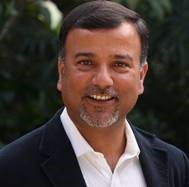
Dear NYF Community,
This year, as we all commit to keeping Olga’s promise—now our shared promise—I often find myself reflecting on Olga didi’s inspirational impact on generations of Nepal’s young people. I am so grateful to you for making this remarkable work possible.
Nepali culture is deeply rooted in relationships, and in exchanges between each generation. Our language is full of special family-oriented terms of respect. Additionally, multigenerational homes are very common here. And our most cherished festivals highlight blessings offered to children from their elders.
In the early years, as our beneficiaries began to reach adulthood, Olga was tremendously proud that many of the children we supported began joining our efforts to empower the next generation of children. Their support, combined with the enthusiasm of our loving community in the U.S. and beyond, allowed our work to expand far beyond our expectations.
This trend has continued throughout NYF’s 34-year history. More and more, graduates are using their success to “pay it forward” for the next generation of NYF students. Even the children of long-time NYF staff members have joined our work!
Recently, I received a heartfelt email (below) from Nishant Mahat, the son of long-time NYF team member Reeta Mahat. When Reeta joined the NYF team in 2001, Nishant was only nine years old. Reeta had never anticipated needing to financially support her family. But she found a job at NYF at exactly the right time—and she has been a crucial team member ever since.
Nishant’s Heartfelt Email
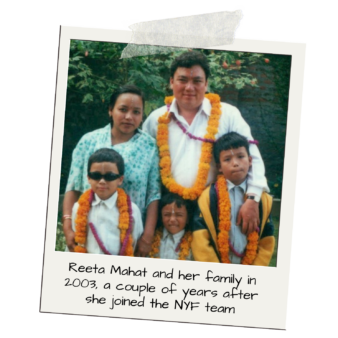
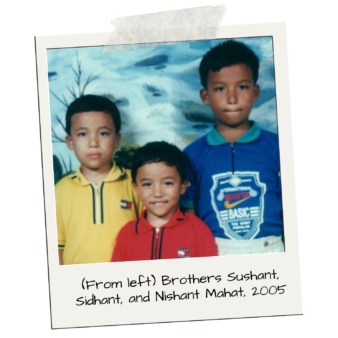
To: Som Paneru
From: Nishant Mahat
Subject: Contribution to NYF
Dear Som Uncle,
I have seen NYF grow over the years very closely and it gives me immense pleasure that NYF continues to carry on Olga didi’s dream of making lives better for the most vulnerable in our society.
Among many things, what distinguishes NYF from other NGOs is the integrity it shows in delivering aid to the ones who really need it. As you know, my mother is one of the earliest staffs in NYF and I have witnessed first-hand the passion, devotion and sincerity that she puts into her work. That kind of devotion would not be possible if her work was not making an impact on lives of others. Her dedication strengthens my trust in NYF.
While NYF’s work of helping Nepali children and youth deservedly gets credit, I think what is often overlooked is the impact it has on its staffs’ life and family.
Without my mother’s job at NYF our lives would have turned out very differently and not in a good way. Sushant, Sidhant and I always considered ourselves beneficiaries of NYF. So, it is time I think I give something back.
The idea of giving back has always driven us. Sushant has donated to NYF before and his company matches his donation. Sidhant, when he was here, also made contributions. Therefore, it would be an honor for me to contribute to NYF as well.
Sincerely,
Nishant Mahat
The Mahat Brothers: Supporting NYF
Today, Nishant is a successful software engineer in Kathmandu. His younger brother Sushant works in the U.S. at a leading-edge tech company.
Their youngest brother, Sidhant, unfortunately passed away while hiking in Colorado in 2022. He was pursuing his master’s degree in computer science and already supported NYF whenever he could. His family finds comfort in knowing that Sidhant’s spirit of generosity lives on in the kids he helped to empower.
I was very moved by Nishant’s email. His thoughtful compassion clearly shows that he is following in his mother’s (and brothers’) footsteps. And his desire to give back to NYF to support the next generation of Nepal’s children means much more than financial numbers.
Caste Equality Project Updates & Next Steps
Now, I want to take this moment to share this one-pager which provides an overview of our Caste Equality Project work from the past year. It also includes exciting next steps. Photos from Saptari District remind me of the early days of the Indentured Daughters program. In 2000 and 2001, we had no idea how much we would accomplish by empowering young Tharu women to reject oppressive systems and demand change. Thanks to support from people like you, in just 20 years, childhood indentured servitude changed from a day-to-day reality in their communities to an illegal, widely-rejected relic of the past.
Now, with support from you and young, inspired Nepali people like Nishant, Sushant, and Sidhant, we are building that same momentum in Dalit-majority villages in Saptari District.
We hope you’ll help us keep our transformative shared promise by making a generous gift today.
Onward!
Som Paneru
NYF President
Why Your Review on GreatNonprofits Matters
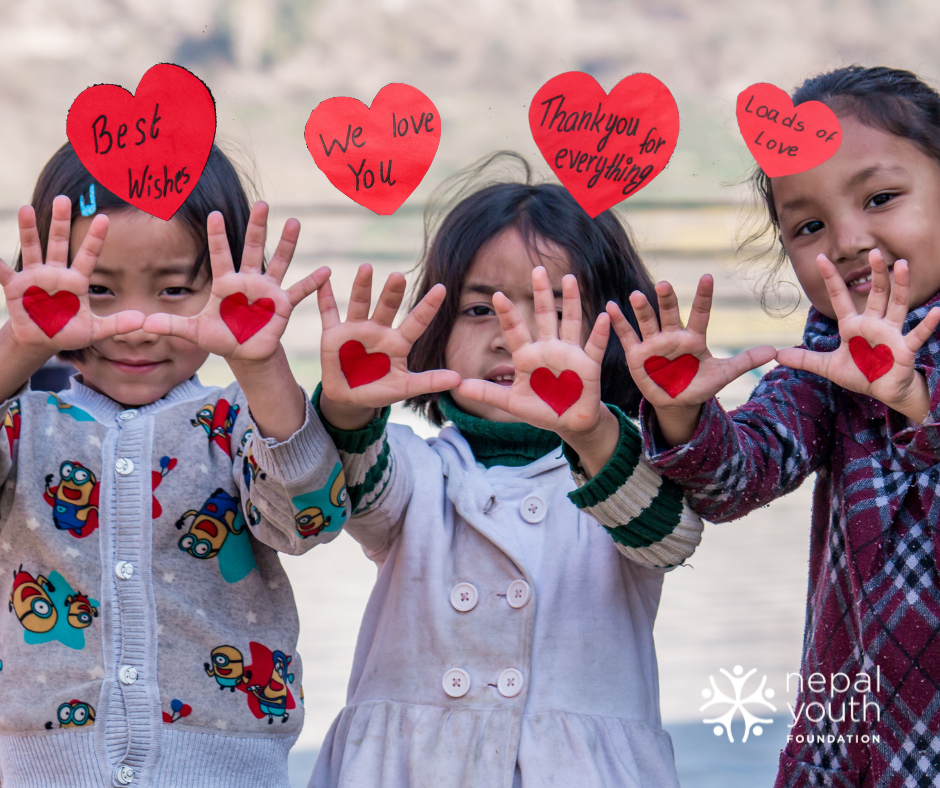
In today’s digital age, reviews hold immense power. They guide donor decisions, influence public perception, and help people discover new opportunities. For nonprofits like the Nepal Youth Foundation (NYF), reviews on platforms like GreatNonprofits are not just feedback—they’re a lifeline that can amplify our collective impact.
A Legacy of Empowerment
NYF was founded in 1990 with a simple yet powerful mission: to help Nepali children access education. Our founder, Olga Murray, was nearing retirement when she embarked on a Himalayan trek in 1984 that would change her life—and the lives of countless Nepali children. Inspired by the children she met, many of whom dreamed of an education but had little hope of receiving one, Olga began offering scholarships out of her own pocket. This small act of kindness blossomed into what NYF is today: a multifaceted organization addressing Education, Health, Shelter, and Freedom, with a strong emphasis on Nepali leadership and expertise.
Since its inception, NYF has aided over 60,000 children and families in Nepal. Our programs are developed and run entirely by Nepali people, ensuring that our work is culturally relevant and deeply impactful. Olga’s vision continues to guide us as we adapt to meet the needs of the communities we serve. At NYF, we are committed to honoring Olga’s memory and original promise, now our shared promise, to educate and empower the young people of Nepal.
Tackling Caste Discrimination: The Caste Equality Project
Today, Olga’s legacy lives on through the Caste Equality Project.
NYF is taking on the challenge of dismantling caste-based discrimination with our ambitious initiative, the Caste Equality Project. Although caste-based discrimination has been illegal in Nepal since 1963, the Dalit community—historically known as “untouchable”—continues to face severe social, economic, cultural, religious, and political marginalization, especially in rural areas. This project aims to empower Dalit individuals to access opportunities, defend their human rights, build prosperity, and dismantle the oppressive systems standing between them and the safe, dignified lives they deserve.
Are you as inspired by Olga’s promise to Nepal’s children as we are? You can help us honor Olga’s memory right now by writing us a review on GreatNonprofits!
The Power of a Review
When you write a review on GreatNonprofits, you do more than just share your experience. You contribute to a collective voice that can attract new supporters, volunteers, and donors. Your words become a beacon for others, guiding them toward a cause that resonates with their values.
For NYF, this means more people can learn about our mission to empower children in Nepal through Education, Health, Shelter, and Freedom.
Visibility and Credibility
With so many great causes competing for support, ensuring NYF is seen and heard is vital. Positive reviews boost NYF’s visibility on GreatNonprofits, often resulting in higher rankings and more exposure. This visibility can lead to increased donations, which directly support our transformative programs and the children we serve. Moreover, potential donors often seek validation from others before contributing to a cause. A well-written review can provide the credibility they need to make that decision confidently.
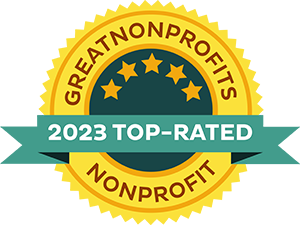
Building a Community of Supporters
Reviews also help build a sense of community among our supporters. When people share their stories and experiences with NYF, they create a narrative that others can connect with. Thus, this community-driven approach fosters a deeper sense of belonging and commitment among our supporters, strengthening the foundation of our mission.
Check out this quote from a review left by one of our beloved volunteers!
“I recently had the honor of volunteering with the Nepal Youth Foundation (NYF) during their Founders Day, and I can’t speak highly enough of my experience. NYF is a remarkable non-profit dedicated to transforming the lives of Nepal’s most underprivileged children by providing essential healthcare, education, and a safe environment. Their mission is both vital and inspiring. What I found most impressive was the way NYF’s values and mission were embodied in every aspect of the event. It’s evident that their work extends far beyond organizing events; it’s about making a meaningful difference in the lives of children in need. My time with NYF was both fulfilling and inspiring, and it reinforced my admiration for their dedication to creating opportunities and improving lives.
If you’re considering supporting or volunteering with a non-profit, I wholeheartedly recommend the Nepal Youth Foundation. Their unwavering commitment to their mission and the profound impact they have on children’s lives make them a standout organization.”
– NYF Volunteer & Friend
How You Can Help
If you’ve been touched by the work of the Nepal Youth Foundation, we encourage you to take a few minutes to write a review on GreatNonprofits. Your experience—whether as a donor, volunteer, or advocate—can inspire others to join our cause. Undoubtedly, each review has the potential to bring in new resources, helping us reach more children and expand our programs.
Here’s how it works:
- Follow the link, or click the button below, which will take you to our profile on GreatNonprofits.
- Click on the orange “Share your story” button.
- Fill out the review page. You’ll have to use at least 50 characters to share why you love NYF.
- Click “Post Review.”
- Register by inputting your email address, and creating a Username, and Password – and then you’re done!
A Lasting Impact
By writing a review, you’re not just sharing your story—you’re shaping the future of NYF. Your words can inspire others to join our cause, creating a ripple effect of positive change that extends far beyond the initial review. Indeed, it’s a simple act, but one with profound implications for the children and communities we serve in Nepal.
Thank you for being a part of our journey to provide Education, Health, Shelter, and Freedom to thousands of Nepali children. Together, we can build on this powerful momentum, creating brighter futures for the children and building a transformative legacy for generations to come.
Make-A-Will Month 2024
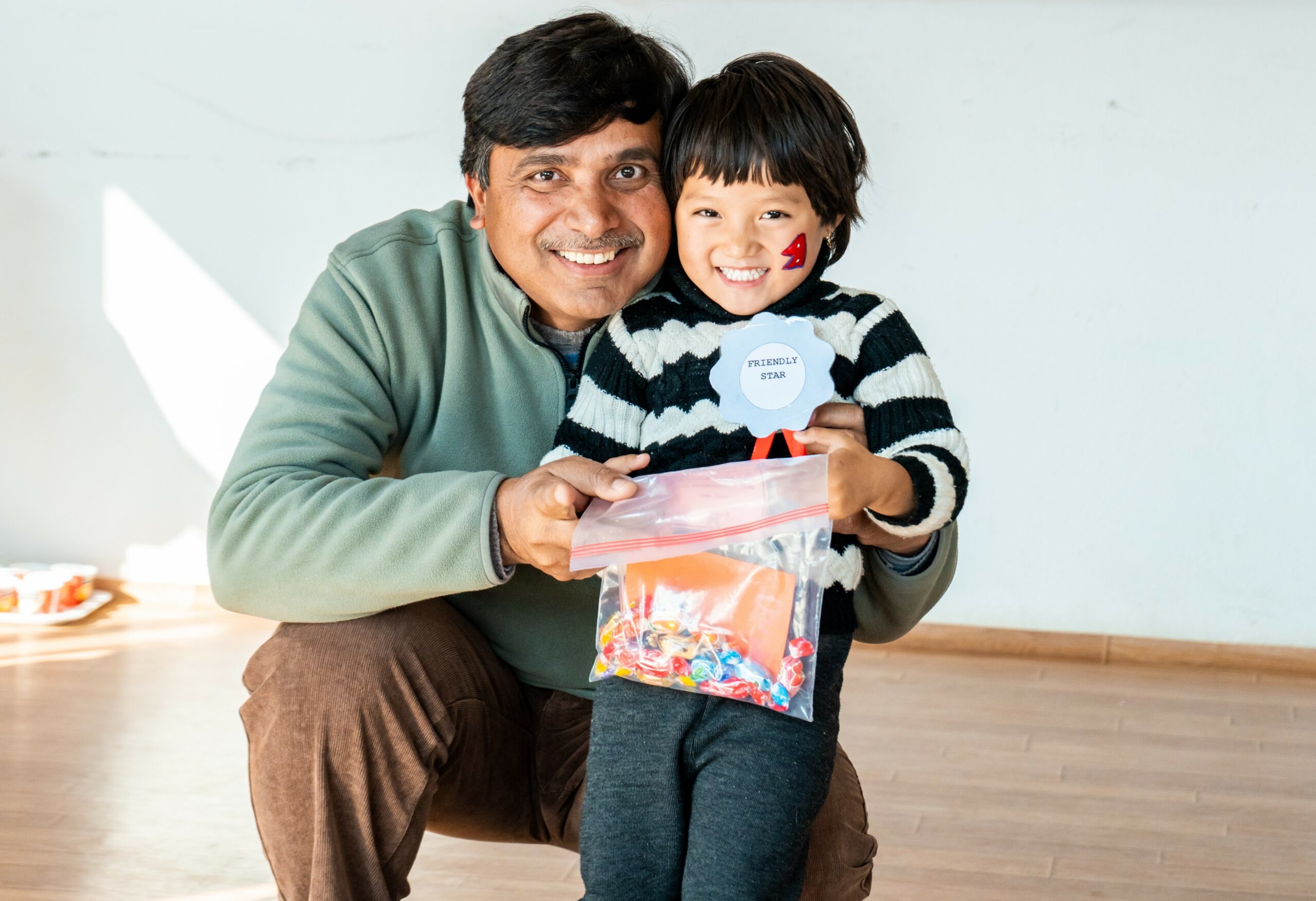
The Power of Planned Giving
August is National Make-A-Will Month—an annual reminder to review your future plans and ensure your wishes are recorded. Here at NYF, Make-A-Will Month 2024 is special. As we continue to honor Founder Olga Murray’s memory, 2024 has become a year focused on legacy.
This post includes new details on NYF’s Legacy Circle and the benefits of early estate planning. We also share more about our new partnership with FreeWill, a free, supportive estate planning resource.
The Nepal Youth Foundation prides itself on building transformational change with slow and steady strength. We make long-term promises to individual children and families, devoting focused attention to creating sustainable, generational triumphs. We devote tremendous effort to refining each program, improving upon our remarkable outcomes year after year. And in everything we do, we think ahead, considering the practical long-term needs of the Nepali children and young people in our care.
Olga’s Legacy
In a time of shortened attention spans and instant gratification, Olga built NYF on principles deeply rooted in wisdom she acquired over nearly a century of lived experience. She knew that truly sustainable social change requires hard work, patience, and committed supporters.
Olga was adamant that at NYF, “we finish what we start.” Launching NYF’s Legacy Circle was just one of the ways Olga committed to ensuring her life’s work continued beyond her lifetime. She became the Legacy Circle’s original member by including NYF as a beneficiary in her estate plans. And NYF’s team set to work raising awareness of the power of planned giving.
Legacy gifts like Olga’s help ensure our proven, transformative programming can withstand unexpected disasters like pandemics and earthquakes. They allow us to maximize the care we offer to the children we serve. Most of all, these remembrances provide the stability we need to continue serving Nepali children long into the future.
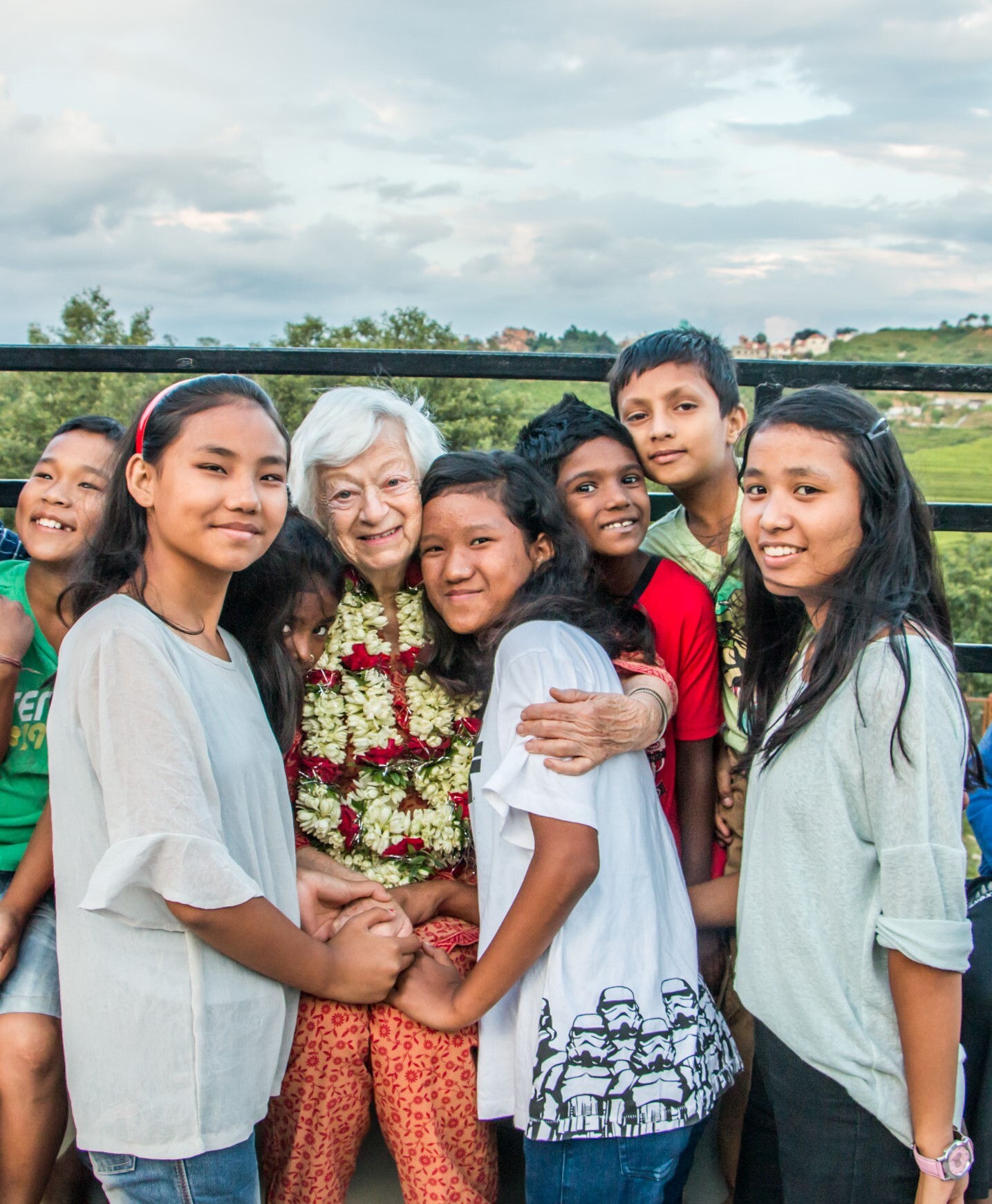
The Legacy Circle
The Legacy Circle is NYF’s way of saying Dhanyabad, or Thank You, to those who remember us in their estate plans.
To join this special group of NYF supporters, all you need to do is let us know you’ve included us in your will or other plans. No minimum bequest is required.
There are many ways to make a legacy gift, including gifts of cash, stock, real estate, retirement funds, life insurance, and more. To learn more about these giving approaches (and ways they may lower tax burdens for your family), please explore our Planned Giving page!
If you have included NYF in your estate plans but are unsure whether NYF is aware of this, please share those details through this form provided by FreeWill.
NYF is currently developing ways to honor the deeply committed individuals who have chosen to join our Legacy Circle. Legacy Circle members receive:
- An enamel lapel pin designed exclusively for NYF’s Legacy Circle.
- Annual Special Impact Report packets including stories, photos, and detailed updates from our programming.
- Small annual gifts (often Nepali tea) with an invitation to a personal meeting with U.S. Executive Director Ryan Walls.
- Early invitations to events like Founder’s Day.
Three Reasons to Make Your Will Now
Many people are surprised to learn that around two-thirds of American adults do not have an up-to-date will.
Reasons for this include not knowing where to start, feeling overwhelmed by the process, and believing only extremely wealthy people benefit from these documents.
Fortunately, starting your estate planning is easier than ever with free tools like FreeWill. And there are many reasons to create or update your estate plan during Make-A-Will Month 2024. Here are just three:
1. A formal will is an important legal document for everyone to have.
All adults, whether you’re 18 or 80, and whether your estate is large or small, should have a will. Your will allows you to distribute your property and protect your loved ones after you pass away.
When you consider your belongings, you may find that you have more property than you realize: your home, vehicles, furniture, clothing, books, sentimental items, and more. With so many assets stored digitally today, you may also possess financial accounts your loved ones are unaware of.
No matter what your age, stage of life, or socioeconomic status, maintaining an up-to-date record of your wishes for your property will ensure that those wishes are carried out, no matter what happens. Many people also find that keeping estate plans up-to-date encourages them to live more fully in the present and enjoy the people they have safeguarded for the future.
2. It provides peace of mind to you and your family.
Times of loss are highly stressful for families. Creating a will prevents family conflict that may arise when wishes for property are unclear. A will gives your family guidance and reassurance that they can fulfill your wishes during this difficult time.
Your will can also name a legal guardian for your minor children and identify who should care for your pets.
Depending on your state’s laws, the absence of a will may result in your estate being distributed by a court system that does not understand your values or your relationships. It may also increase the tax burden on your heirs.
Your up-to-date will is a loving gift to your heirs and beneficiaries, giving them peace of mind during a challenging time. Knowing you have prepared this gift for them gives you peace of mind, too.
3. It lets you create a legacy that lasts beyond your lifetime.
Olga lived to be 98 and a half—an incredible, full, inspirational lifetime she lived to the fullest.
None of us live forever. But Olga has shown us that your power to make a positive impact on the world can last long after you leave it.
Leaving a gift for a nonprofit in your will costs you nothing during your lifetime. But it makes a tremendous positive impact on causes close to your heart for years to come. And as the children who benefit from your gift grow up and invest in the next generation, their triumphs become part of your transformative legacy.
NYF and FreeWill: Make-A-Will Month 2024
This Make-A-Will Month, making a will is easier than ever through FreeWill. FreeWill is a free online tool that will walk you through the process step-by-step. At the end, FreeWill provides you with your completed document, plus clear instructions on how to make it legally binding in your state (for example, letting you know whether you need witnesses or a notary).
Those living outside of the United States or who have more complex estates may still benefit from using FreeWill’s tool as a starting point. Take the completed document with you when you visit your lawyer or financial advisor to use as an outline.
If you choose to leave a gift for a nonprofit like NYF in your will, FreeWill makes that process simple, too.
If you’ve already completed your formal will, this month is a great time to review it! Estate attorneys recommend doing so every three to five years, or whenever you experience a big change (getting married, moving states, or welcoming a new child or grandchild). Things often change faster than we realize, so regularly updating your preferences is important.
You may also wish to make sure you’ve named beneficiaries for your life insurance policies or retirement accounts.
Through NYF’s new partnership with FreeWill, information on estate planning is available right on our website. Click here to start today!
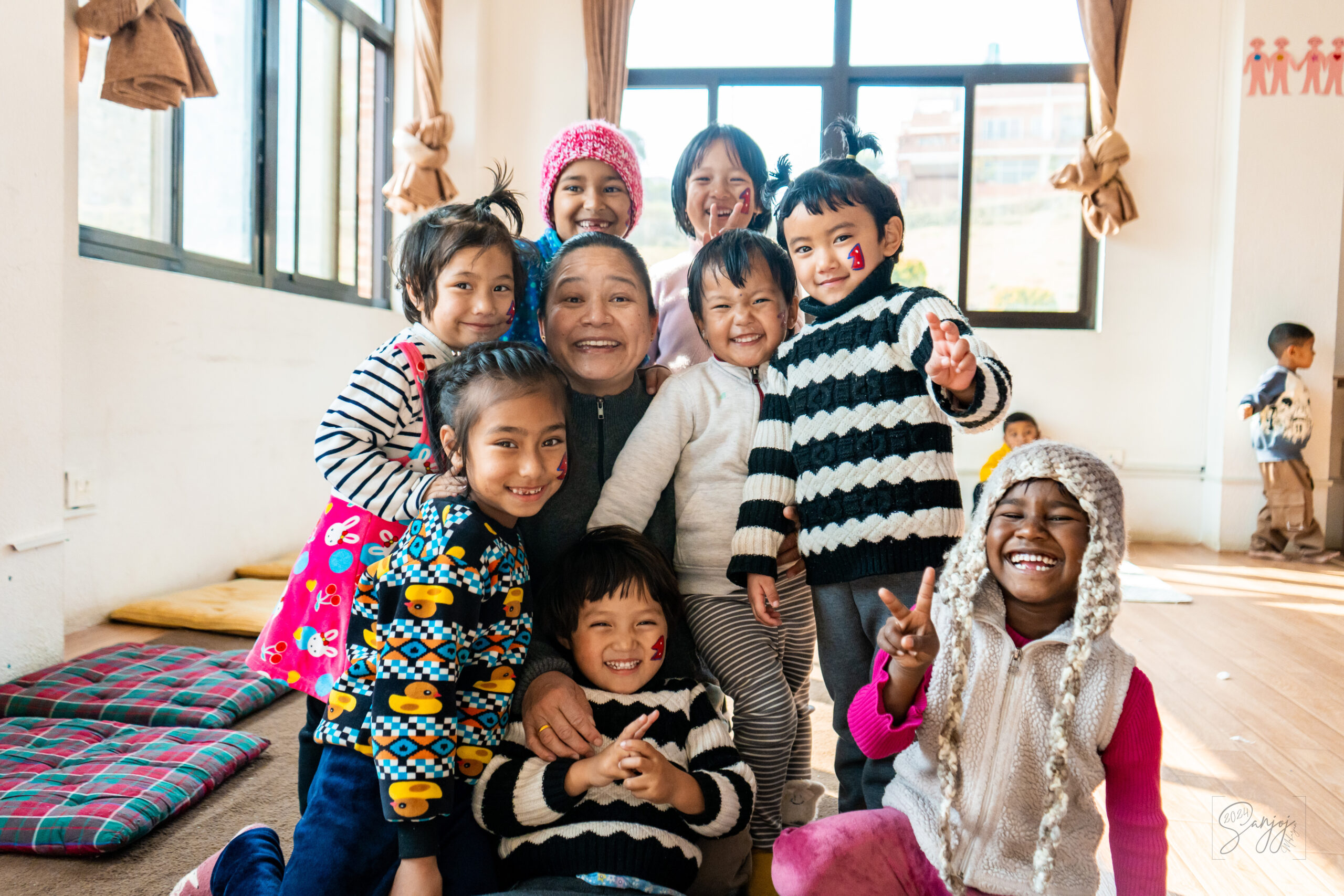
Dhanyabad!
Thank you for everything you do to help support transformative change in the lives of Nepal’s children.
NYF’s entire global team—and the children and families we serve—are so grateful for the tremendous progress your love has made possible since Olga founded this organization in 1990. From all of us: dhanyabad.
One Year of the Community Mental Health Program!
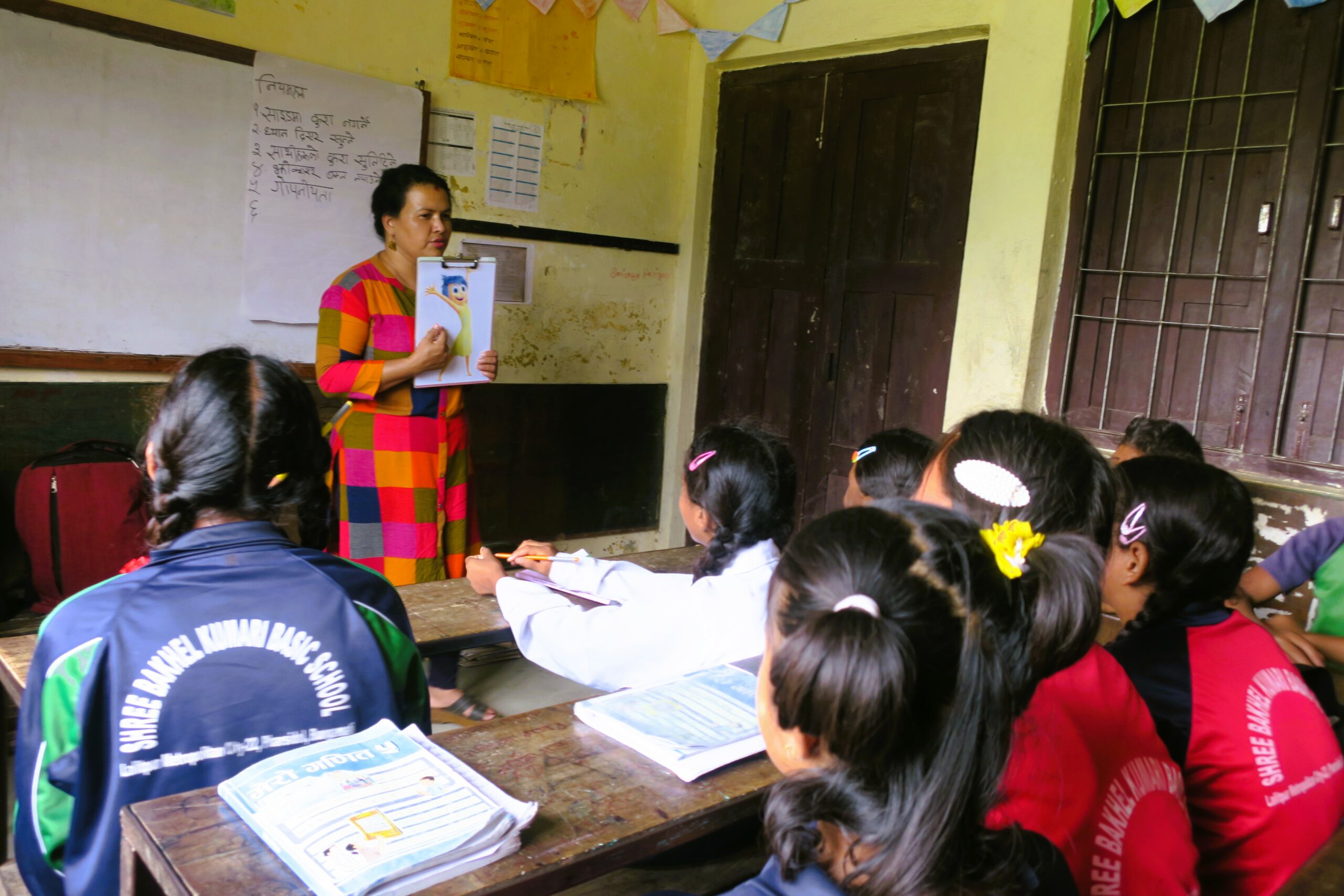
We’re thrilled to celebrate one year of success with our Community Mental Health (CMH) program! Last July, Ankur Counseling Center, in collaboration with Lalitpur Metropolitan City, Ward 22, embarked on a mission to fight Nepal’s growing mental health crisis. The new program will increase access to mental health services and raise mental health awareness in communities across Nepal, starting here in Lalitpur.
The Community Mental Health program mainly includes:
- Monthly Mental Health Desks (also called Man Chautari)
- Mental Health Awareness Training
- World Mental Health Day Celebrations
In close collaboration with community leaders, youth leaders, schools, and healthcare workers, the Community Mental Health program is raising mental health awareness, identifying and addressing mental health issues, and preventing suicide among adolescents and adults.
Click here to see photos of the launch on Instagram in July 2023.
Mental Health Desks (Man Chautari)
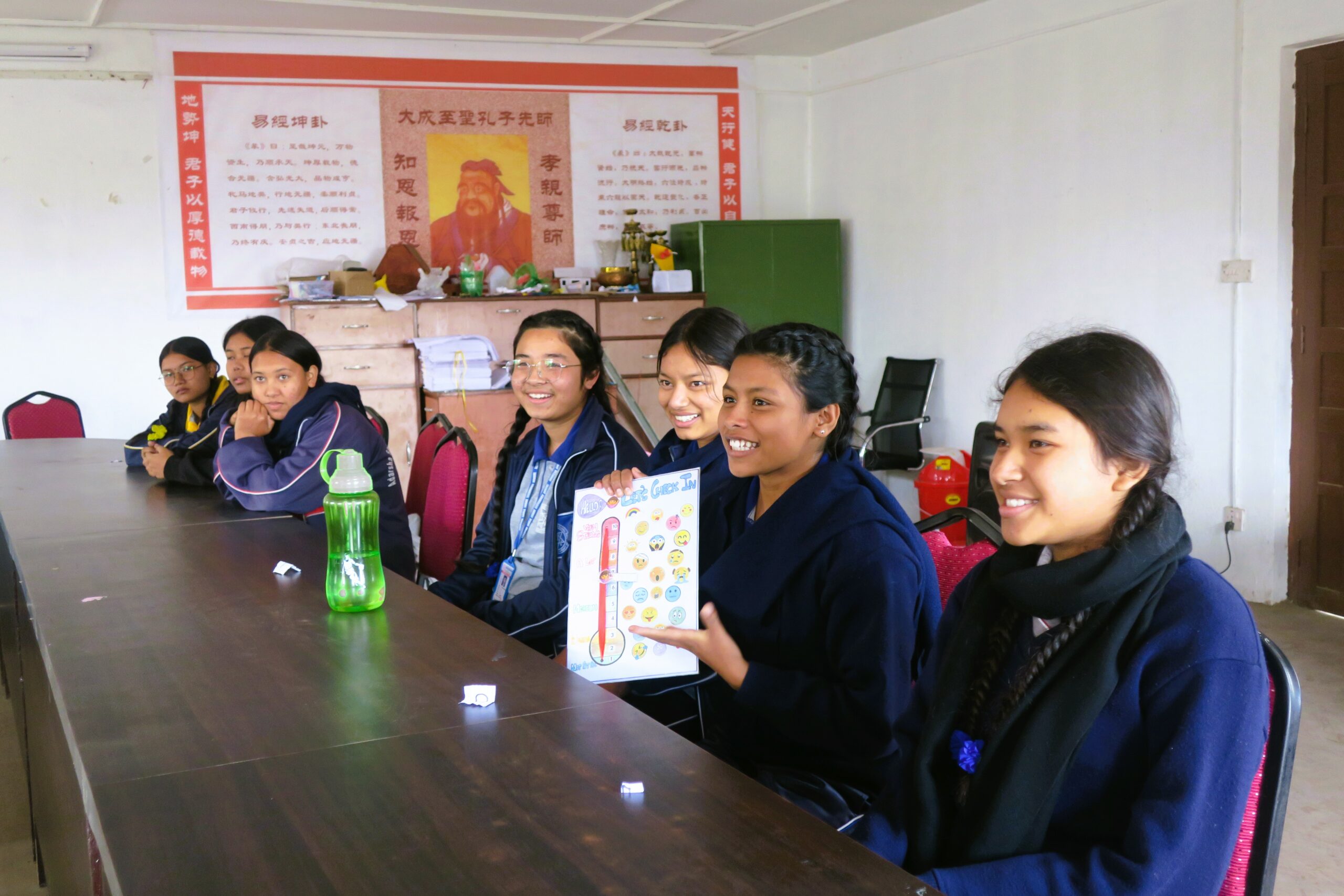
Mental health awareness is extremely low in Nepal, so our Ankur Counseling team is starting from the ground up to build a better community understanding of mental wellness as a concept.
School- and community-based monthly mental health desks, or Man Chautari, provide children and adults a safe place to share their feelings with peers and counselors, individually or in groups, thus normalizing the act of exploring mental wellness in community.
Ankur counselors have been instrumental in conducting these Man Chautari sessions at Adarsha Saula Higher Secondary School, Bakhel Kumari Basic School, and a single women’s group in the community. Additionally, they lead thematic sessions on various psychological topics, further enriching these gatherings.
Mental Health Awareness Training
To strengthen mental wellness skills among community leaders and stakeholders from Ward 22, Ankur conducted two three-day training events this past year focused on counseling and effective communication. Participants included schoolteachers, health workers, and volunteers from other local social service organizations.
After the completion of the training, participants gained a deeper understanding of mental health factors and the significance of counseling. Those who attended are not only better equipped to identify psychological issues among their clients, but also offer counseling, and refer cases to Ankur as needed. Even more, participants learned to recognize and interact in a nurturing manner with individuals exhibiting suicidal tendencies.
In Ward 22, where mental health challenges and suicide rates are significant, participants strategized to raise awareness and prevent suicide. A 2023 survey conducted by the Community Mental Health Program revealed that 26% (80 out of 310) reported experiencing suicidal thoughts. Additionally, police reports recorded 13 suicides last year in a population of around 8,000. Our team aims to lower these rates and improve community access to quality mental health care.
We are encouraged by the progress made in training community leaders and stakeholders in Ward 22 to address mental health challenges. Therefore, the Community Mental Health Program will continue to place a significant focus on suicide prevention by equipping participants with the skills to recognize and support individuals with suicidal tendencies. Our comprehensive approach includes raising awareness, providing counseling, and ensuring access to quality mental health care. As a result, we are creating a safer and more supportive environment for everyone in Ward 22, and beyond.
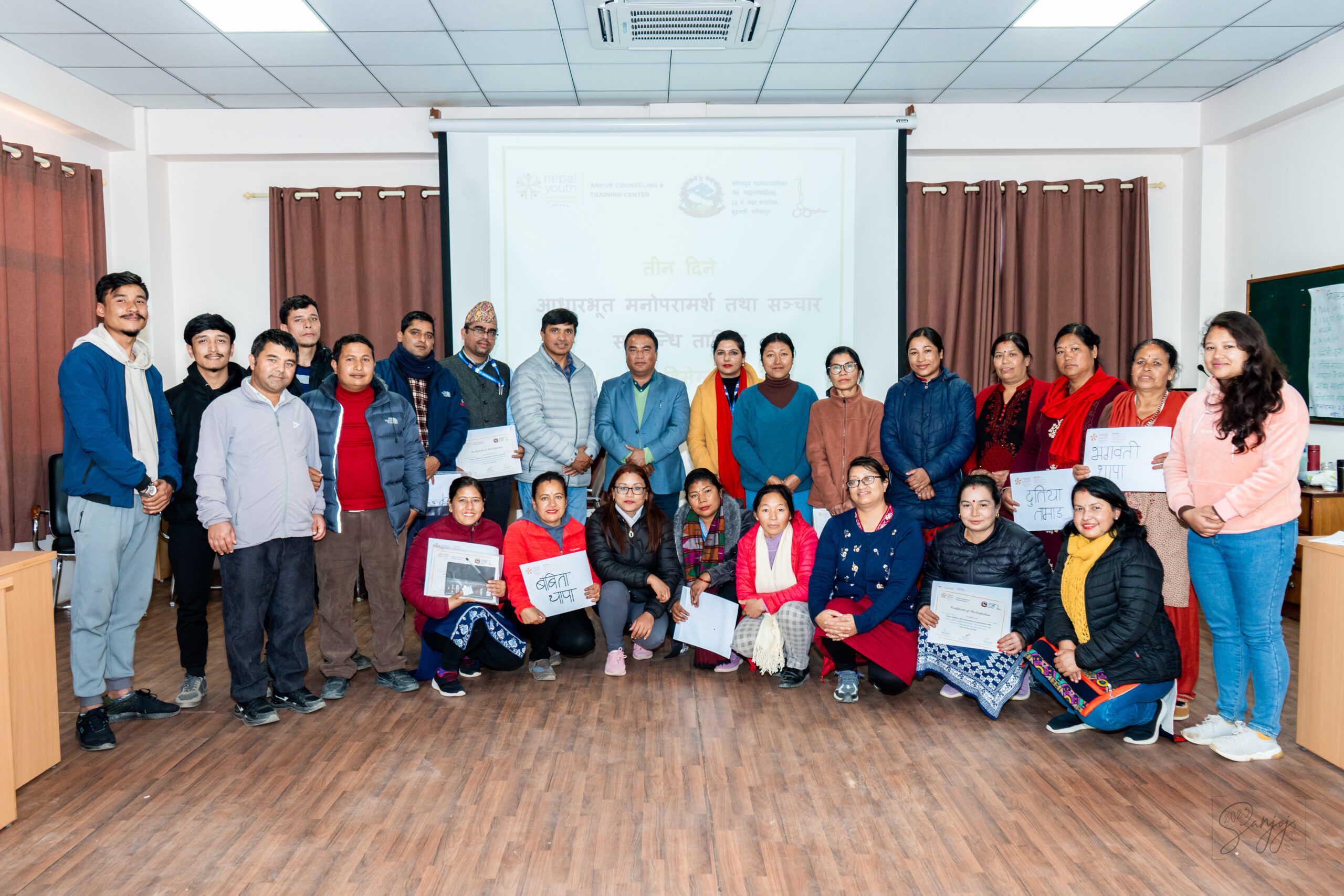
Creative Movement Therapy (CMT) Training
A group of healthcare workers and community health volunteers, participated in Creative Movement Therapy (CMT) training at Ankur Counseling Center. CMT is a psychotherapeutic framework that utilizes the mind-body connection and movement to release emotional and physical stress.
World Mental Health Day Celebration
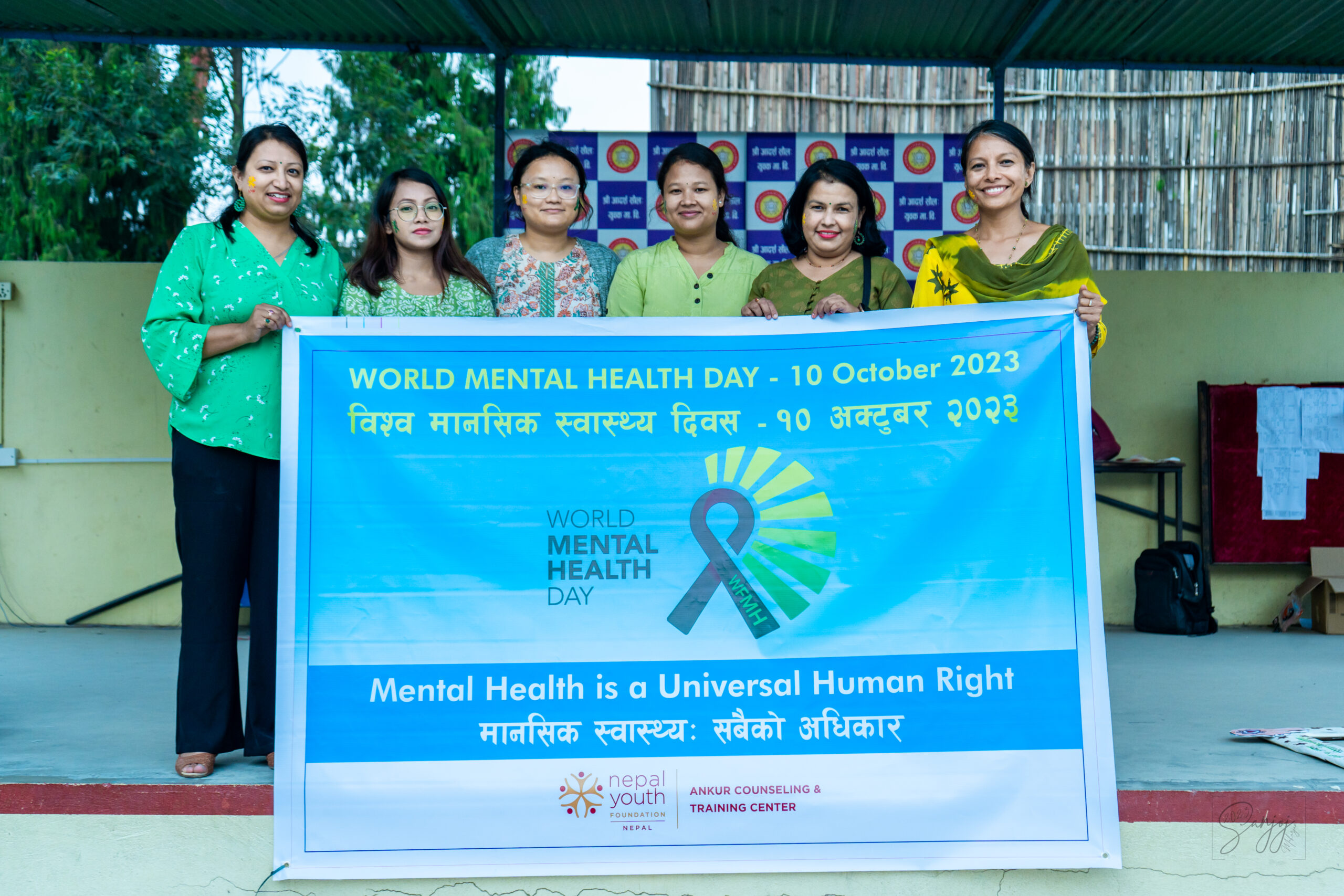
NYF celebrates World Mental Health Day every year on October 10th. This last year was no exception—with special mental health awareness programs focusing on schools. Ankur organized art competitions, poster presentations, speeches, and face painting at Adarsha Saula Secondary School. The program was chaired by the Chairperson of Ward 22, Lalitpur Metropolitan City and attended by students and teachers.
Click here to see photos from World Mental Health Day on October 10, 2023.
We extend our heartfelt thanks to our community of donors for their unwavering support of Ankur and this program. Your contributions make a significant difference in our efforts to address mental health in Nepal. As we look to the future, we are excited about the continued growth and impact of this initiative. Ankur, Nepal’s original child-focused counseling center and a leader in mental health awareness, is proud to take this important step forward. Together, we are paving the way for a brighter, healthier future for communities across Nepal.
You are not alone. If you or someone you know is experiencing a mental health crisis or thoughts of suicide, get help right away by contacting your physician, go to your local ER, or call the suicide prevention hotline in your country. For the United States, you may call or text the Suicide Prevention and Crisis Hotline at 988 or message the Crisis Text Line by texting “HOME” to 741741 or visiting https://www.crisistextline.org/. Both programs provide free, confidential support 24/7.
Founder’s Day 2024: Recap & Recording
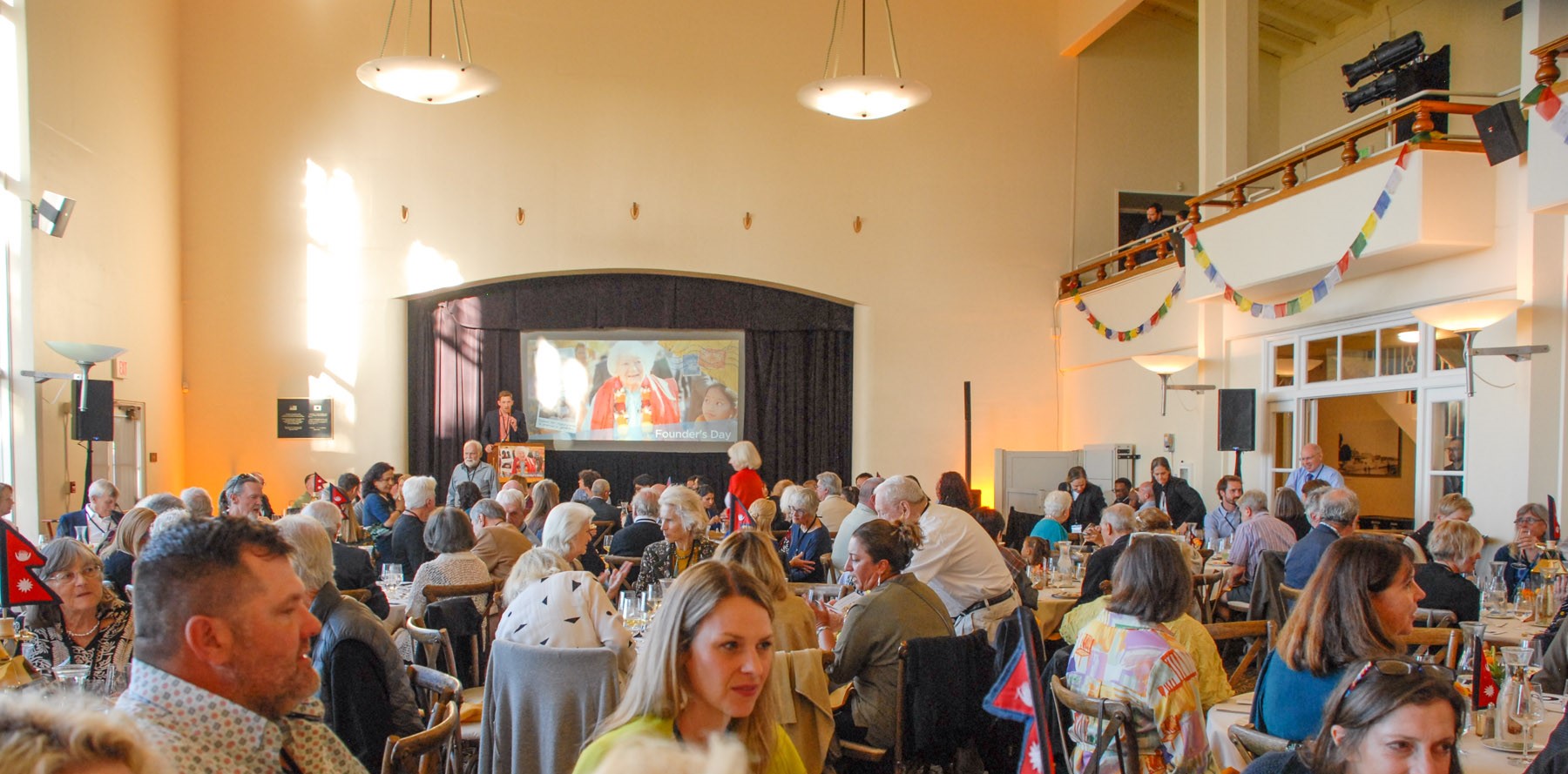
Every year, NYF’s global team is reminded of the many reasons to be grateful for our remarkable community of supporters and friends. Thank you to everyone who joined us for Founder’s Day this year on May 30th, 2024.
It was a bittersweet night as the NYF Community reflected on Olga’s remarkable life, celebrated her transformative legacy in Nepal—and recommitted to our shared promise to Nepal’s rising generation. We hope the evening was as meaningful for you as it was for us.
If you were unable to attend Founder’s Day 2024 in person (or if you would like to share the evening with a friend or over social media), the event is now available through our YouTube channel. You can also view it below:
Tribute Room (Now available digitally as an online gallery!)
At Founder’s Day this year, an entire room was dedicated to honoring the life of NYF’s late founder, Olga Murray. In this tribute room, we collected meaningful moments and treasures from Olga’s life and placed them throughout the space. Friends, family, and NYF supporters gathered together—in tears and in laughter—to remember Olga’s amazing story.
Since this tribute room was a such a highlight at Founder’s Day, we decided to create an online version so that our friends around the world could also “gather” in celebration of Olga’s extraordinary life.
Click here to visit the digital tribute gallery!


Fundraising Goal & Update
This year’s Founder’s Day event was both a celebration of life for Olga Murray, as well as a fundraiser to honor her dearest wish: for her work in Nepal to continue. With that in mind, we set an extremely ambitious fundraising goal of $340,000—by far our most ambitious goal to date—in honor of Olga’s 34 years of impact in Nepal.
We are thrilled to share that so far, including donations and pledges, we have surpassed the previously unimaginable figure of $350,000!
Our global team is so grateful for the incredible love of the NYF Community. The funds raised at this event will go so far in ensuring Olga’s legacy continues—providing Education, Health, Shelter, and Freedom for the children of Nepal. They will also allow us to build our momentum in Saptari District, offering transformative Caste Equality Project programming from a position of strength and stability, achieving sustainable results right away. If you would like to make a gift in honor of Olga and Founder’s Day, please click here.
(The thermometer above only reflects gifts we’ve received and does not yet include pledges. We expect the total to increase as pledges are fulfilled!)
Endowment Campaign
At the end of Founder’s Day 2024, we also announced our forthcoming endowment campaign. This is a major step for our organization, inspired by Olga’s generous legacy gift.
Olga chose to dedicate the value of her beautiful Sausalito home to supporting NYF in perpetuity. Her most fervent wish was to ensure that NYF’s programs, especially Olgapuri Children’s Village, could continue as long as they are needed by the children of Nepal. Olga’s remarkable bequest will lay the foundation for the endowment campaign. We will share more about this ambitious campaign in the coming months.
Olga was the original, founding member of NYF’s Legacy Circle. NYF is currently refining and deepening our Legacy Circle process through a partnership with FreeWill—an organization providing free access to will-making services as well as user-friendly support for those wishing to make donations to nonprofits using assets like stocks, retirement accounts, Donor Advised Funds, and cryptocurrency. Keep an eye out for updates in the coming weeks on this new partnership!
Thank you all again for your commitment to our shared promise.
Thank you to everyone who registered, attended, participated, and donated. Thanks, too, to anyone who invited a friend or spread the word. A very special thank you goes to filmmakers Roy Cox and Robin Mortarotti; to the volunteers, board members, advisory board members, and staff working behind the scenes; to our Nepali team members Raju Dhamala, Anjita Parajuli, and Lalit Gahatraj for traveling to join us, and of course, to Sean Murray, Som Paneru, Gina Parker, and Angela Pal for their heartfelt remarks.
Our team is overwhelmed with gratitude for your belief in Olga’s promise—now, our shared promise. Stay tuned for updates on the Caste Equality Project as we continue to scale our work in Saptari District!
Thank you, and Dhanyabad!
If you would like to see more photos from Founder’s Day 2024, please click here. Please email us for the password as the gallery is password-protected.
Spring Updates from Saptari District
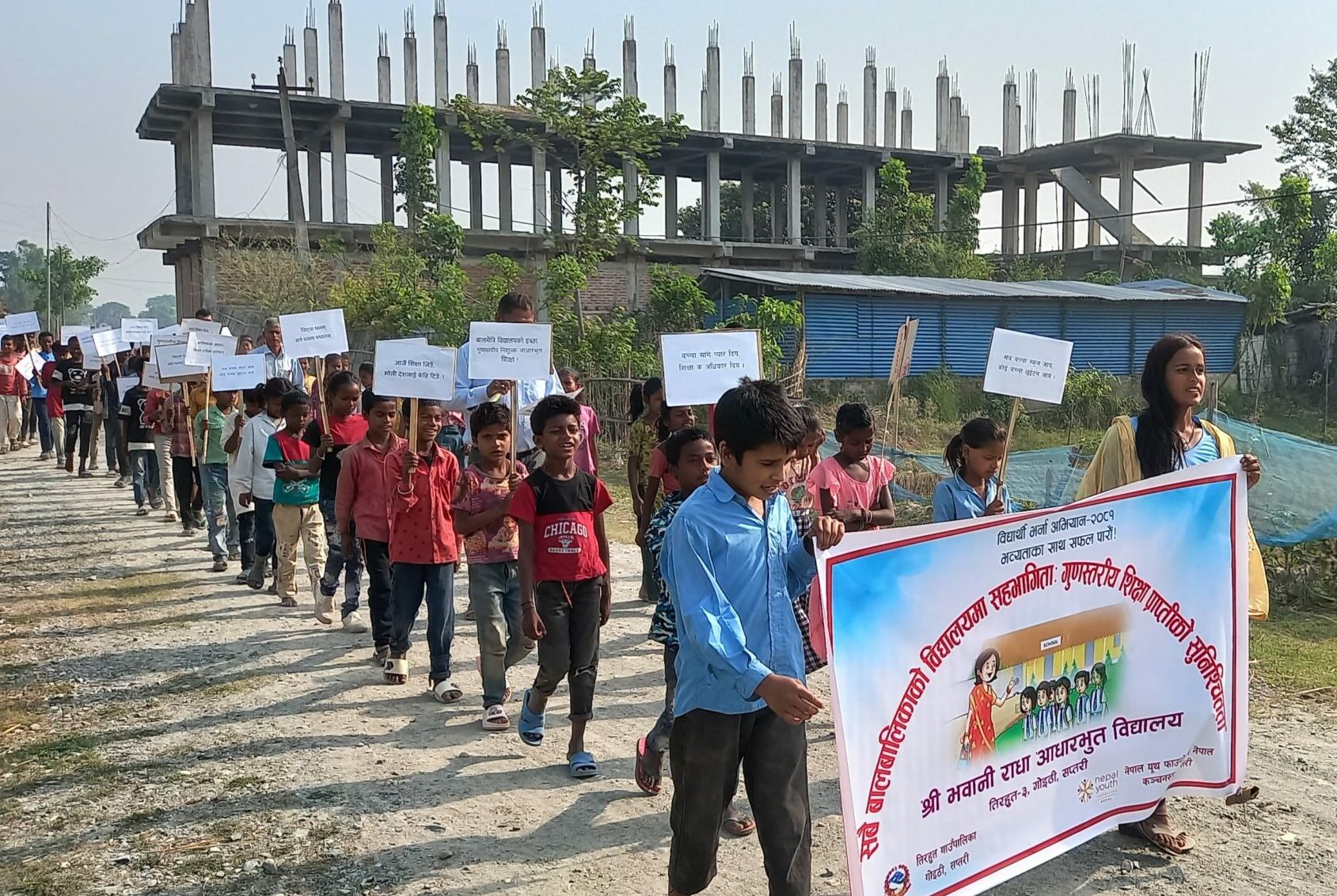
NYF’s long-term Caste Equality Project (CEP) is our most ambitious and daring undertaking yet. Our goal is to empower Dalit communities in Nepal to access the opportunities and resources they need to build towards the futures they envision for themselves and their children.
In order to meet these goals, NYF launched two phases of the Caste Equality Project. Phase I was the Educating Dalit Lawyers (EDL) initiative, which we launched in the summer of 2022. (You can read more about EDL here). Phase II of the Caste Equality Project takes place in Saptari District. The project is led by NYF’s very own Lalit Gahatraj, and it officially launched in the summer of 2023. We’re anticipating the work in this phase to be a decades-long project in order for us to truly build a transformative and sustainable movement.
Almost a year into the launch of the project in Saptari District, we’re thrilled to share some exciting updates!
Education Advocacy
At the end of April, NYF officially launched the School Enrollment Campaign for students in Saptari District in Tirhut Rural Municipality. In collaboration with the local government, NYF set into motion a vibrant initiative aimed at boosting school enrollment in the region. Our dedicated team, alongside enthusiastic students and teachers, began spreading the word across communities with energizing rallies and personalized home visits to promote the value of education.
On May 3rd, NYF kicked off the campaign by taking to the streets. Community members and students made posters and marched through their communities while chanting inspirational slogans like, “Send all children to school/leave no one behind!” & “Quality education is our right!”
Our team also made door-to-door visits to encourage parents to enroll their children in school. At the same time, they addressed concerns and answered any questions parents may have.
Then, in mid-May, NYF distributed hundreds of school uniforms and bags to children in the region. These uniforms were handmade by our industrial tailoring students enrolled at Olgapuri Vocational School. You can read more about this unique, cross-program detail in a recent blog post, here.
The School Enrollment Campaign ran until May 10th. Lalit Gahatraj, CEP Coordinator, shared that the early signs are very promising, with an uptick in school attendance already noted! This surge is partly attributed to the community buzz around NYF’s scholarships and nutritious mid-day meal programs, which are drawing more and more families to enroll their children into school.
Peer Counseling Program
In mid-April, thirty girls (aged 13 to 19) from the rural municipality of Tirhut in Saptari District, traveled with our staff to Olgapuri Village to participate in a five-day Peer Counseling training at our very own Ankur Counseling Center. The training began April 23rd.
For many of these girls, it was their first time leaving their village, a journey that brought both excitement and apprehension. Our staff dedicated a lot of time to earn and maintain their trust while supporting them every step of the way.
Building peer counseling skills within individuals will help empower young leaders to make an impact in their own communities. This is a prime example of NYF’s approach to addressing the “felt needs” of communities over “observed needs,” which includes recognizing community members as experts of their own experiences, successes, and challenges. This community-centered approach is a cornerstone of NYF’s strategy to ensure sustainable, far-reaching social change!
We’re excited to see the impact this peer counseling program will have on the wider Dalit community.
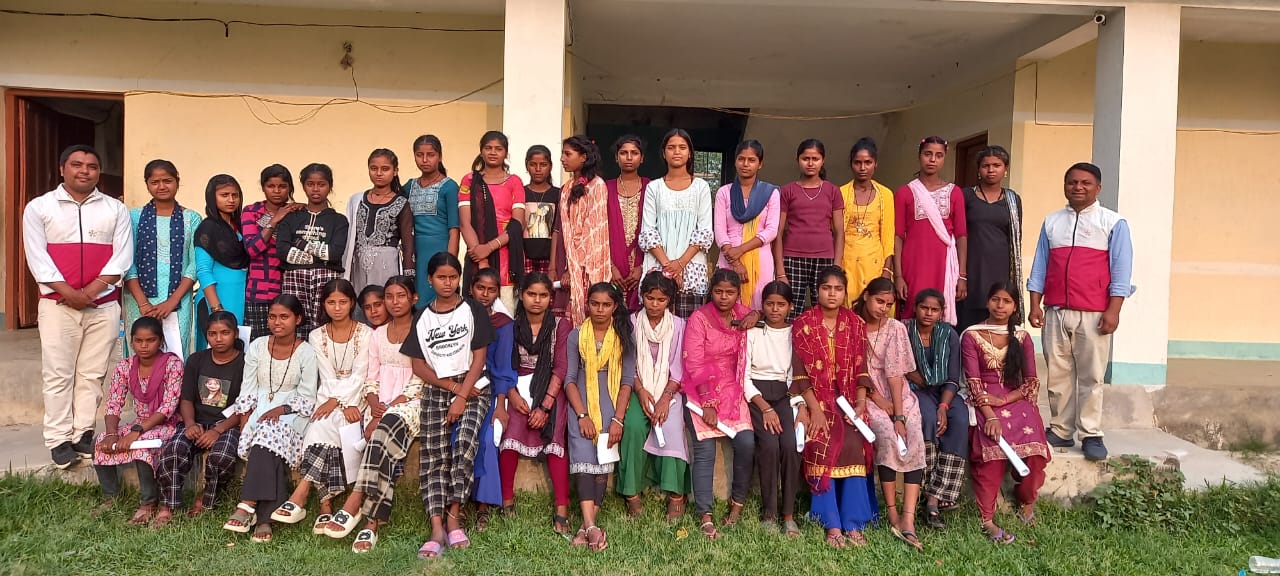
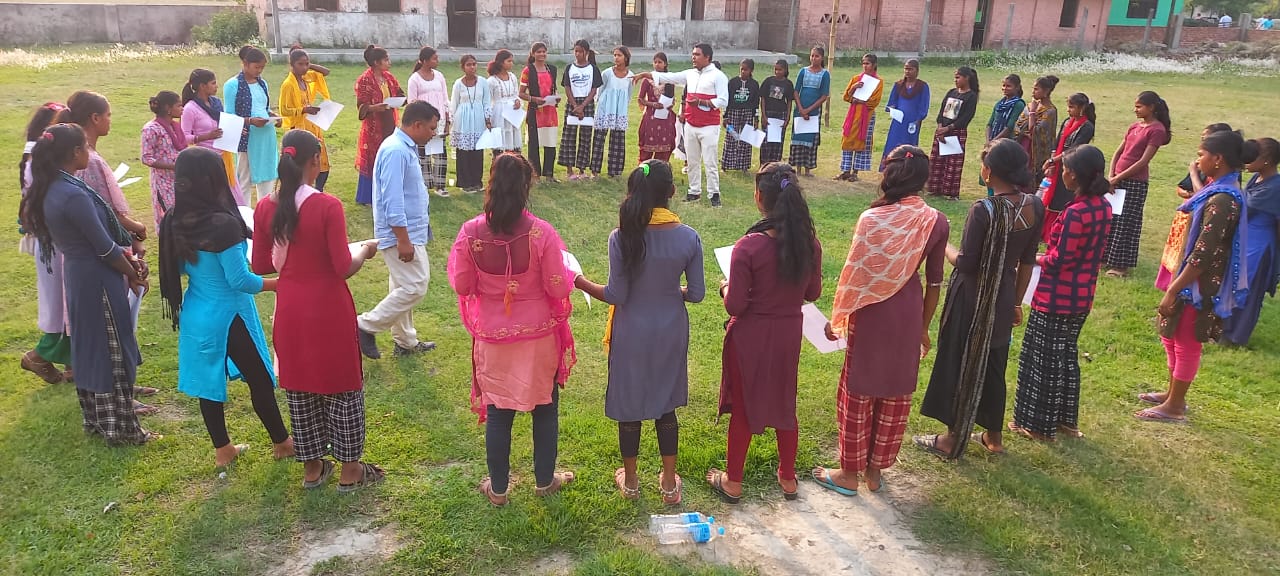
Engage with this update on Facebook or Instagram.
Street Drama Campaigns
In February 2024, over 100 people gathered to watch ten girls from Tirhut Rural Municipality, Saptari District, perform their first street drama. Their play tackles various scenarios related to child marriage. This included dowry negotiations by the groom’s family and self-serving middlemen, the squandering of dowry funds on alcohol, a daughter’s stand against her forced marriage, and harmful consequences for girls experiencing early marriage.
The audience, including men, women, children, and elders, responded positively. During a guided discussion following the play, one man observed, “We often engage in certain practices without fully comprehending the consequences. This play was an effective eye-opener.”
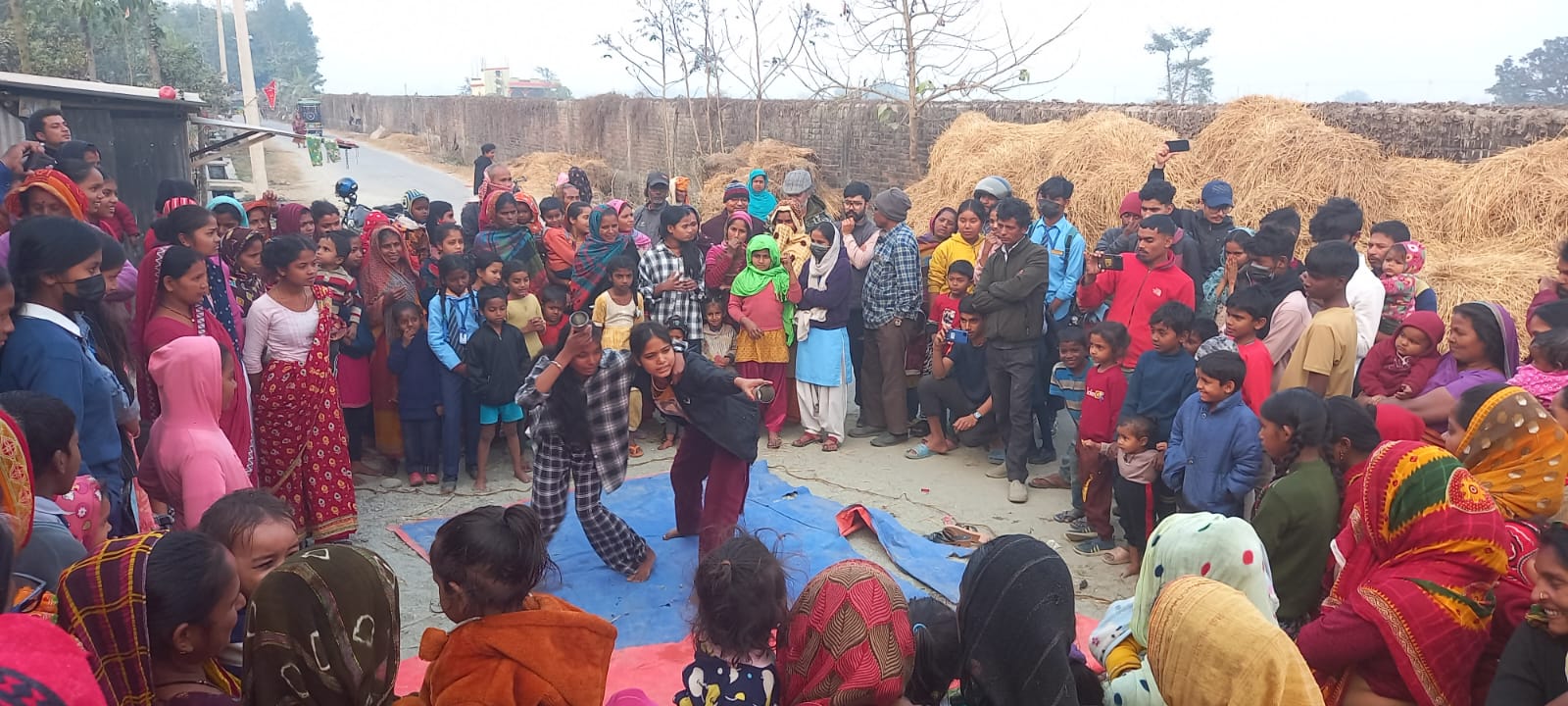
New Community Centers in Saptari District
Construction begins with a groundbreaking ceremony
In early April, NYF hosted a groundbreaking ceremony for the construction of two new community centers in Saptari District. The ceremony was completed in collaboration with village members, and a respected elder named Chebli Sada performed a “jag puja,” or foundation blessing, to purify the land. The blessing was an important start to the construction of the ceremony because it allowed a connection to the spirits of the land and the ancestral deities of the people we’re serving. She also led a prayer to ensure a smooth progression of construction, free from hindrances and misfortune. Offerings of sweets, betel nuts, betel leaves, and incense were buried beneath the foundation, symbolizing a blessed new beginning.
Since the ceremony, construction on the two community centers have been underway, with a tentative completion date for June.
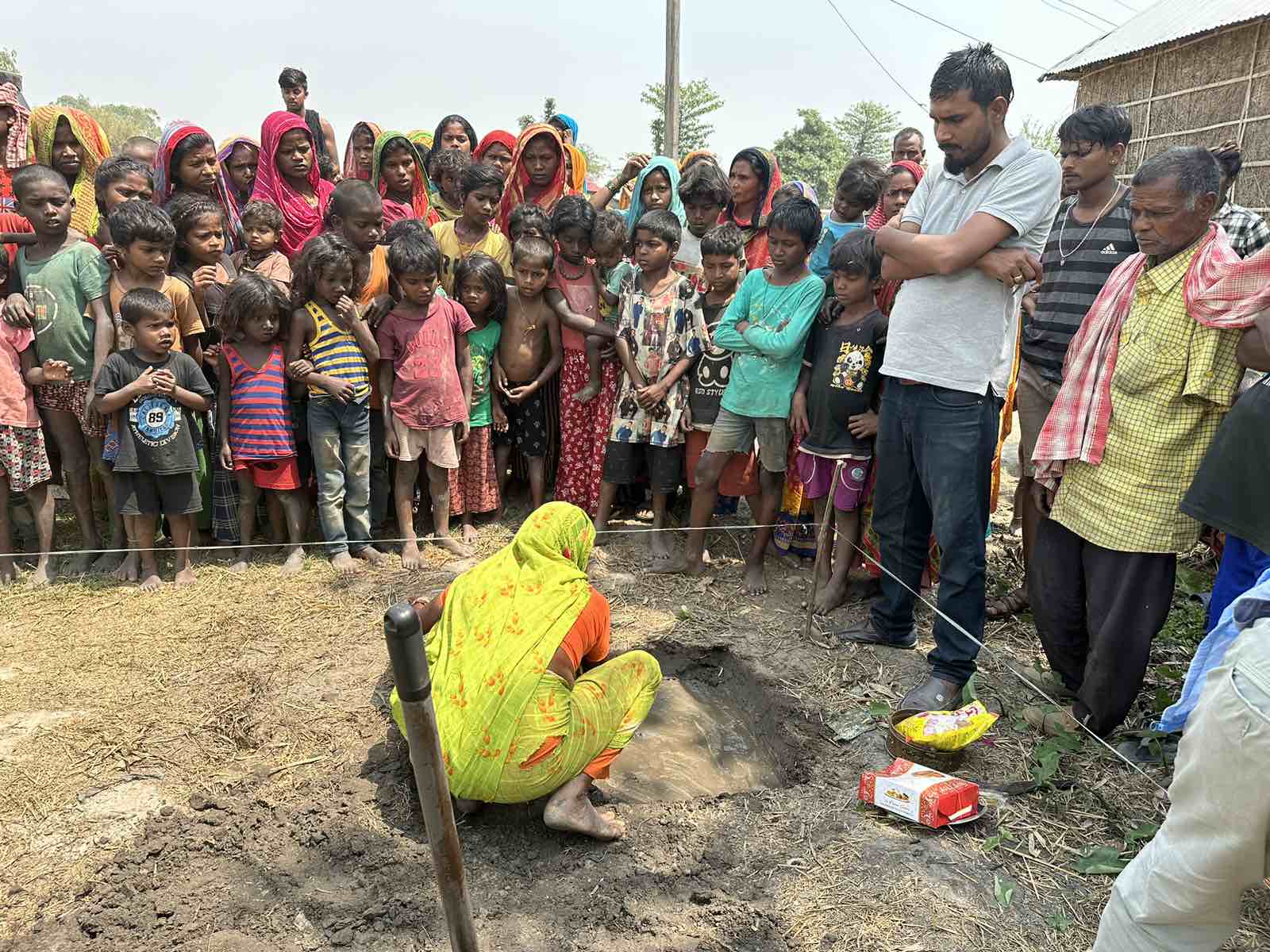
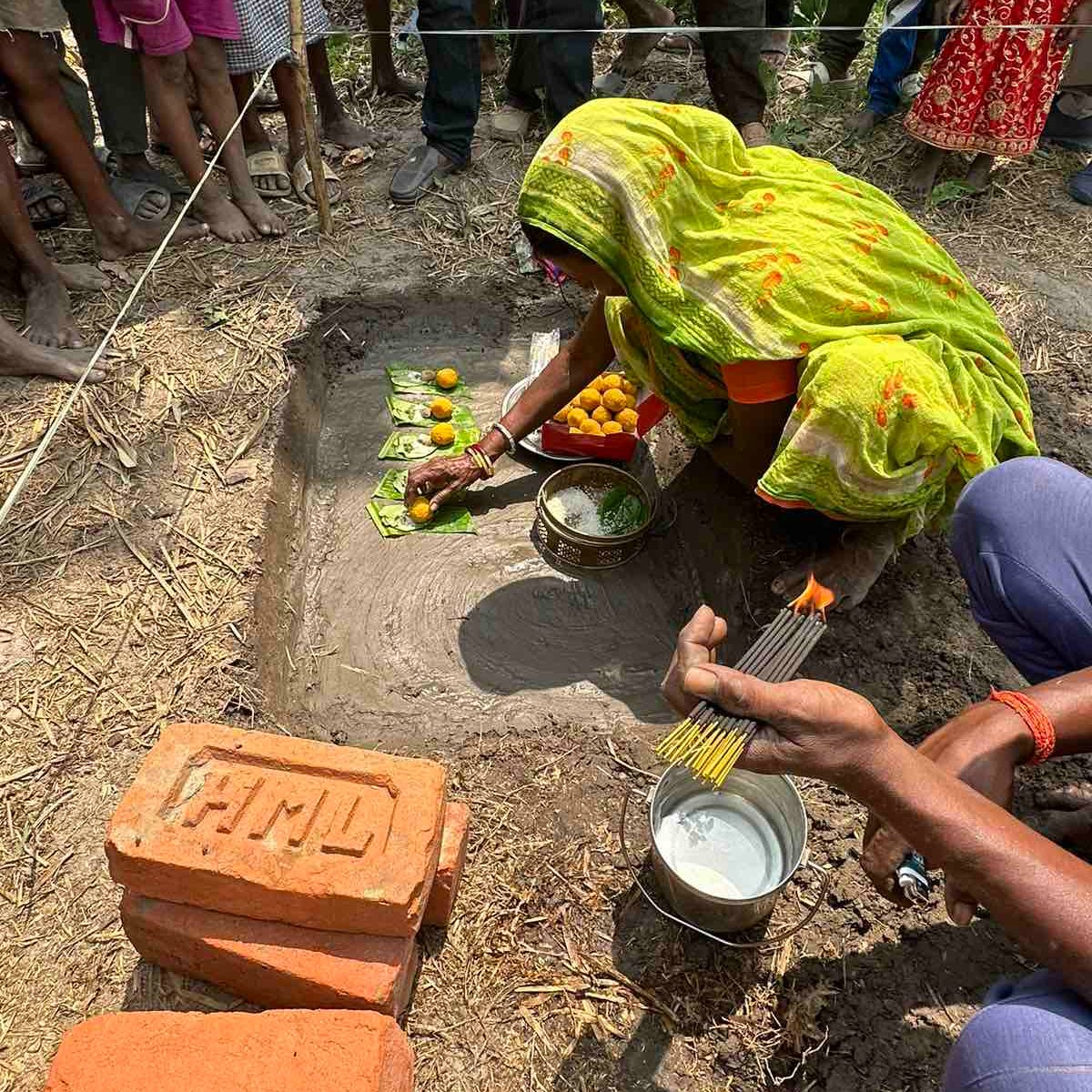
Community Centers will serve as vital hubs for Caste Equality Project programs
These two community centers in Saptari District will house most of our programs in the Caste Equality Project, holding spaces for education, childcare, and other important initiatives like:
- Adult literacy classes (reading, home finance, legal literacy)
- Town meetings where teachers, parents, and local leaders build community-wide, unified strategies
- Nutrition-focused home cooking classes for mothers, applying NRH principles
- Disaster preparedness programs
- Peer counseling
- Women’s empowerment and co-op groups
- Teacher training
The plan is to hire staff for the centers from within the communities served, to build sustainable local capacity. Each center (and we hope to build more!) aids NYF’s sustainability in Saptari District, expands and enhances regional impact, and resources NYF to pursue its vision for meaningful change for the communities served. The more centers we fund, the more strongly we can scale while maintaining existing momentum.
The enthusiasm from the community in response has been heartwarming. We’ve seen widespread eagerness to engage, a testament to the importance of community involvement in bringing sustainable changes. Our late founder Olga Murray’s vision is alive and well, manifesting visibly in the strides we are making in Saptari District.
These initial campaigns have been made possible by several generous friends in the NYF Community. But we still need wider support to continue our work within (and beyond) the Caste Equality Project. Please click here to make a donation if you’re able to!
Staff Spotlight: Ram Babu Rai
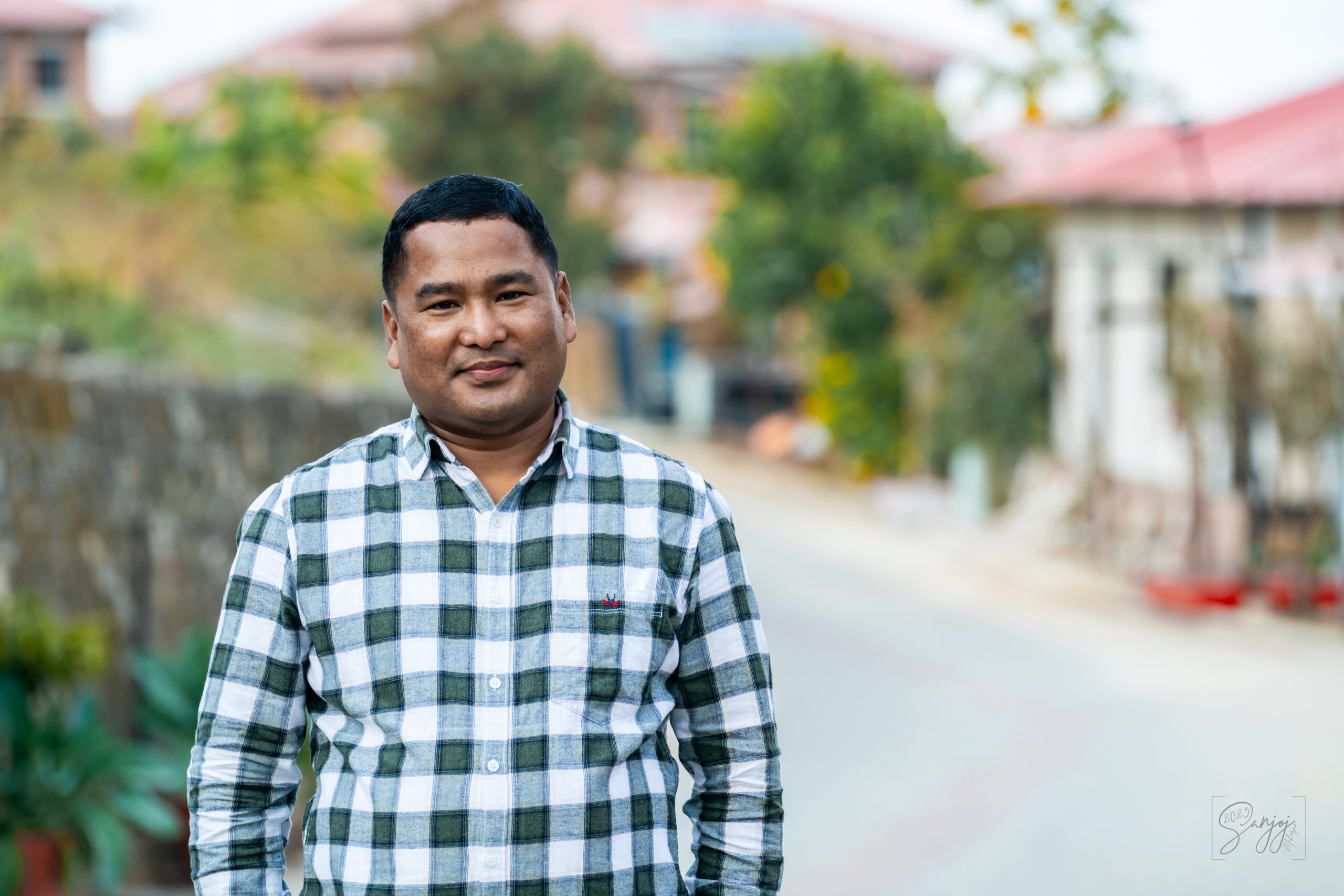
Ram Babu Rai: Kinship Care Program Officer & Technical School Scholarship Officer
In December 2023, Ram Babu Rai dropped in to check on Niraj*. Niraj is an NYF scholarship recipient who had recently completed culinary school. Niraj’s grandmother was overjoyed to welcome Ram Babu, proudly sharing stories of her grandson’s recent successes, including his wonderful new job in a Kathmandu hotel. Niraj was making more than enough money to cover all of his expenses. He had even bought his grandmother a gorgeous new sari as a gift. Beaming with joy, she placed the sari in Ram Babu’s hands so he could admire it. When Ram Babu looked up at Niraj, the young man smiled with a hard-earned confidence.
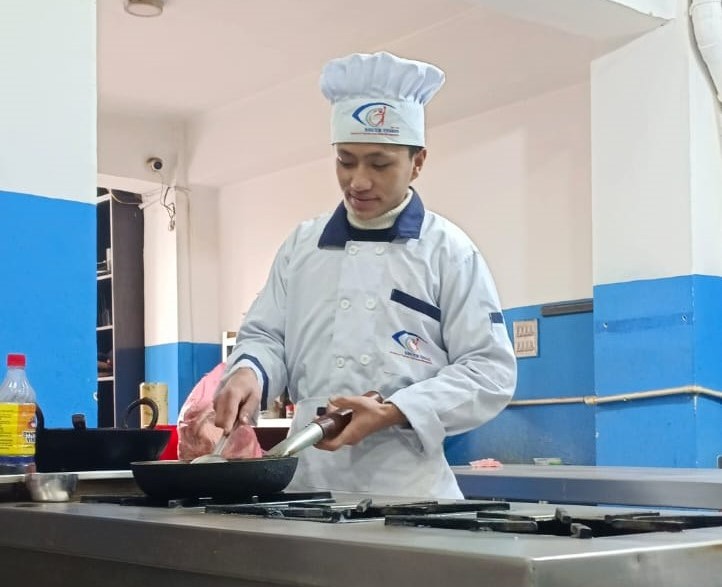
“This is the unique quality of NYF,” Ram Babu explains. “NYF takes a personalized approach. Each child is given support based on their actual needs rather than a blanket approach. We build a relationship with the children and families we serve and provide mentoring and guidance over the years. At the end of it, each individual child’s life is visibly transformed. We do not abandon children halfway.”
For children in NYF’s Kinship Care program and those receiving Technical School Scholarships, it is Ram Babu who builds and maintains that crucial relationship. He rarely has what one might call “office time”. Instead, he’s almost always out in the field, managing more than 250 individual cases at a time.
Ram Babu Rai’s Background
Ram Babu Rai comes from the Rai community, one of the oldest distinct ethnic minorities in Nepal. About 2.3% of Nepal’s population belongs to this group, mostly in eastern Nepal. Rai culture, languages, history, and traditions are unique—which has unfortunately resulted in “outsider” status within Nepal’s broader systems.
Growing up, Ram Babu lived in a small agricultural village in Nuwakot District, in the Himalayan foothills not far from Kathmandu Valley. Public education was not available for most children there, and it was given a very low priority by the community. When families could somehow afford to send children to school, they focused on educating their sons—never their daughters.
As in many rural communities throughout Nepal, arranged child marriage was very common in Ram Babu’s village, for both boys and girls. These marriages serve a complex purpose within the social network of the community, connecting families and forming the basis for close relationships into the future.
Ram Babu was only 14 when his parents arranged his marriage to Laxmi—and she was only 13. Both were too young to truly understand the impact such a marriage would have on their lives moving forward. “I don’t even recall my marriage,” Ram Babu says now. “But I still own a little coat from my wedding, reminding me how little I was at the time.”
The Realities of Child Marriage
At first, Ram Babu’s marriage didn’t change much about his life. His family was well-off enough to send him for an education, and his studies continued after his wedding. But as the years passed, Ram Babu realized that his experience and Laxmi’s experience were very different.
“While I was able to continue my education up to my bachelor’s degree,” he says, “my wife’s life was trapped in childrearing, household chores, and laboring in the farm.”
Laxmi was only 14 when they became parents for the first time, and the experience was devastating for her health. Neither of them had realized the long-term impact early childbearing could have, and Ram Babu was horrified. He was even more horrified to learn how common Laxmi’s experience was for girls and women in his community.
To this day, preventing child marriage is a deeply personal, important issue for Ram Babu—especially for girls. “I’m happy that at NYF I can work on something that is very close to my heart: preventing child marriage through education.”
Making a Change
Ram Babu’s education outside of his village opened his eyes to possibilities his community was missing. By the time he was a young adult, he had become one of the most educated people in the village—and he didn’t want to leave his community behind.
“These were my own family, uncles, aunts, and relatives,” he says. “I was pained by the utter poverty of my community. The condition of the girls was worst. They were oppressed and beaten and not given any opportunity. I felt that education and awareness would somehow help the community make any breakthrough from the current situation we were trapped in.”
Ram Babu and a few likeminded friends established a small private school right in their village. This opened up a new opportunity for local boys and girls. They didn’t have much, but they put everything they could into this venture. Ram Babu became one of the teachers.
That’s where Ram Babu Rai was working when he met Som Paneru and NYF in 2007.
Joining NYF
In 2007, NYF had heard about the situation for young girls in rural Rai communities. In response, we had sent a small team to explore the possibilities of starting an education program.
Som and the team were impressed to discover Ram Babu’s school in one of these villages. Ram Babu was thrilled at the idea of bringing in outside support to supercharge his goal of empowering Rai girls. When NYF confirmed they would be able to start an education program here, Som asked if Ram Babu would be interested in becoming NYF’s implementation leader on the ground. Ram Babu accepted, and he’s been with NYF ever since.
“We launched the Rai Girls’ Education program starting with 150 scholarships for girls in my village,” Ram Babu recalls. “We gradually expanded to other villages and supported over 300 girls. Besides scholarships, we built three schools in coordination with the local government, provided additional teachers, and ran teacher training to improve the quality of teaching and learning in the schools.”
In these early years, Ram Babu also oversaw new community centers where girls and women could access safe, trustworthy childcare while they attended classes or went to work. “These spaces became a hub for discussing social issues and raising awareness against early marriage and other harmful practices.”
He was also honored to take part in preserving parts of the Rai culture that were rapidly disappearing, collecting and documenting information with Nepal’s National Language Academy.
A Growing Career in Child Protection and Education
Ram Babu is particularly proud of a group of Rai girls who didn’t quite fit into the regular academic track. He instead enrolled them in vocational and technical training programs in areas like nursing and land surveying. “All these girls are now government employees,” he says. Before, Rai people were almost completely absent from these professions, and even from the government. “They call me sometimes to share news about their jobs or achievements,” Ram Babu says happily.
Ram Babu’s work at NYF expanded rapidly to encompass other village-based scholarship programs. He’s now in charge of the entire Kinship Care program as well as our Technical School Scholarship program, bringing highly personal attention to each of the 250+ individuals NYF serves each year.
“I follow up on each student physically at least once every three months,” he explains. “I visit their school, as well as their home and family, and even the local government offices if needed, ensuring that they are doing well and attending school regularly.” Some students have special medical conditions that require extra support—Ram Babu monitors these things as well, ensuring that each child’s Kinship Care stipend is appropriate and sufficient for their personal situation.
Ram Babu keeps careful records on each child, collecting receipts and school documents from each family, and taking calls whenever a student or caregiver needs his feedback or advice. He also assesses potential new cases, conducting thorough reviews of each unique situation.
Preventing Child Marriage
All along, Ram Babu’s 30-year relationship with his wife, Laxmi, has deepened into one filled with trust and mutual appreciation.
Early childbearing caused many lifelong health issues for Laxmi, including permanent damage to her kidneys. Both she and Ram Babu are glad she can access regular, good-quality medical treatment for these conditions. They are both eager to discourage other young people from walking the same path.
Despite the challenges, Ram Babu and Laxmi have raised three wonderful children. Their eldest son is now pursuing a master’s degree. Their two daughters are currently working on bachelor’s degrees—a tremendous generational triumph.
In early 2023, while assessing Kinship Care cases in a remote village not far from Ram Babu’s own hometown, he discovered a high rate of similar marriage traditions to those he knew growing up. “The Balami community (a very small ethnic minority) still practices early child marriage and forced marriage,” Ram Babu explains. “Boys are entitled to ‘kidnap’ girls they like and marry them by force.” Once these girls are married, they drop out of school. Most girls in this tiny community don’t make it past 5th grade before getting married or entering the workforce.
Ram Babu took it upon himself to conduct a more thorough assessment. He then recommended to the Kathmandu team that NYF create an enriched Kinship Care scholarship to protect them from these practices. “We’ve now launched a special scholarship program for Balami girls in Kagati Gaun,” he says proudly.
Now in its first year, this mini-program is providing enriched Kinship Care stipends for 15 girls at risk of early marriage due to their families’ economic situation. Parents know that if they allow their daughters to be “kidnapped” or send them to work, the stipends will cease. Ram Babu has established close communication with the local school and the village government to monitor the success of these scholarships in lowering the early marriage and school dropout rates. And he is hoping the project can grow.
Click the button below to make a donation to support this work – and more!
Revival of Hope
Ram Babu’s work is challenging, but very rewarding. “In the 17 years I have worked at NYF, I have never had a day that I felt like not going to work,” he says. Helping bring hope to an overwhelmed family is a special privilege.
“After we study a case and decide to take them in, we tell them about the support they will get: school fees, uniforms, books and stationary, health care, money for food and clothing, etc. It’s usually beyond their expectations and the news re-instills in them a hope for an easier life. I feel fortunate to witness this happiness first-hand.”
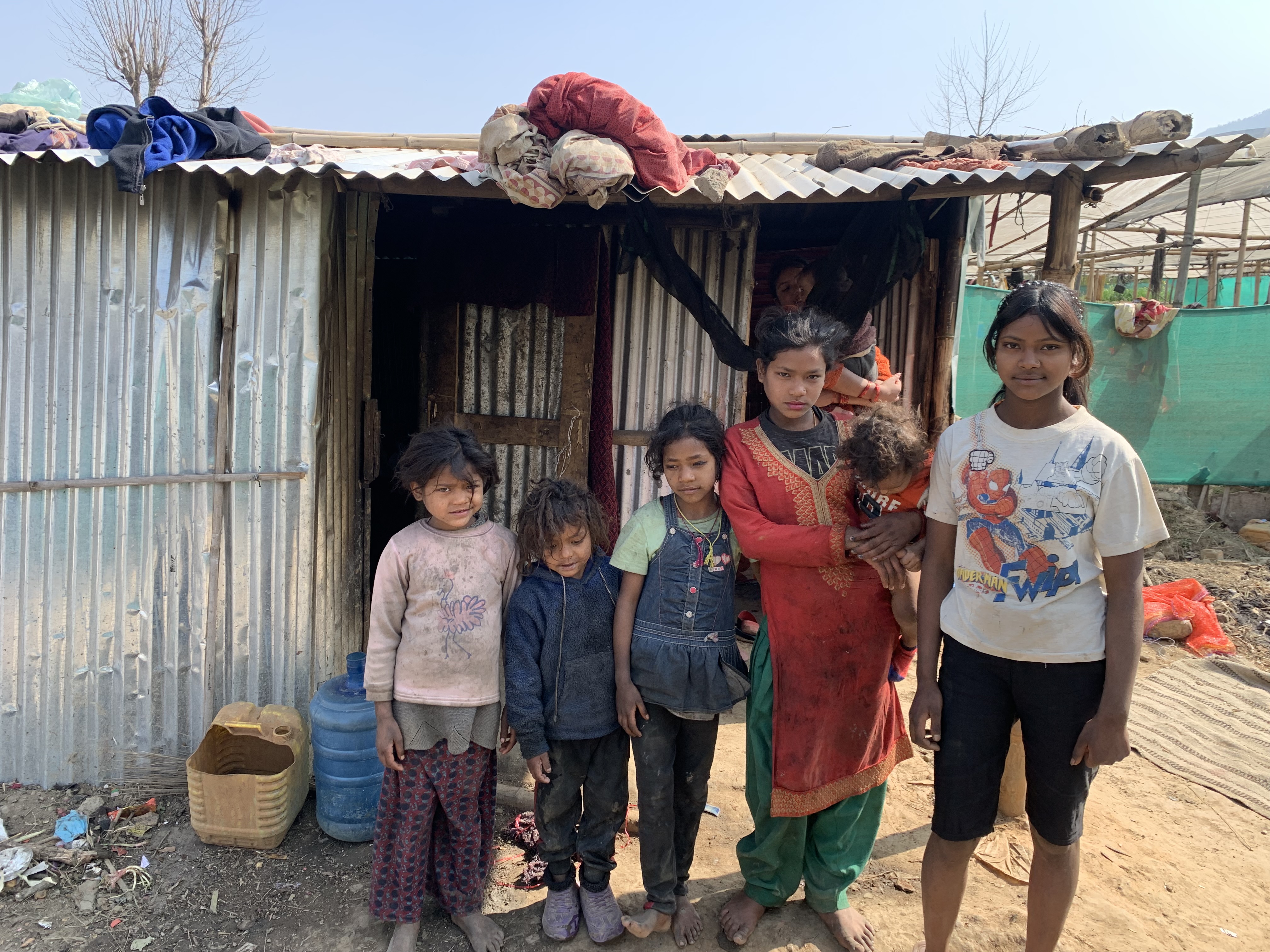
Lasting Impact & Community Recognition
Ram Babu loves his work—and he’s proud that the communities NYF serves are recognizing our impact as well.
One school, near a large slum area on the outskirts of Kathmandu, teaches a particularly high number of our Kinship Care students. These kids are the children of domestic laborers, factory workers, and others who make do by working important but grueling, thankless, and underpaid jobs because they have no other options. Kinship Care stipends allow these kids to stay in school, well-fed and properly clothed, while remaining in the loving care of their hardworking families.
The school serving these children recently honored NYF with an award for the work we are doing. Before NYF got involved with these communities, kids from this area frequently dropped out of school to help support their families. Schoolteachers described how many of these kids, disillusioned by how impossible it seemed to access any further opportunities, were never able to achieve their tremendous potential.
Now, thanks to Kinship Care stipends, many kids who originally faced similar prospects are becoming engineers, doctors, government employees, agriculturalists, and much more. And they’re bringing some of that success back to their families and greater communities.
Olga’s Promise is now our shared promise
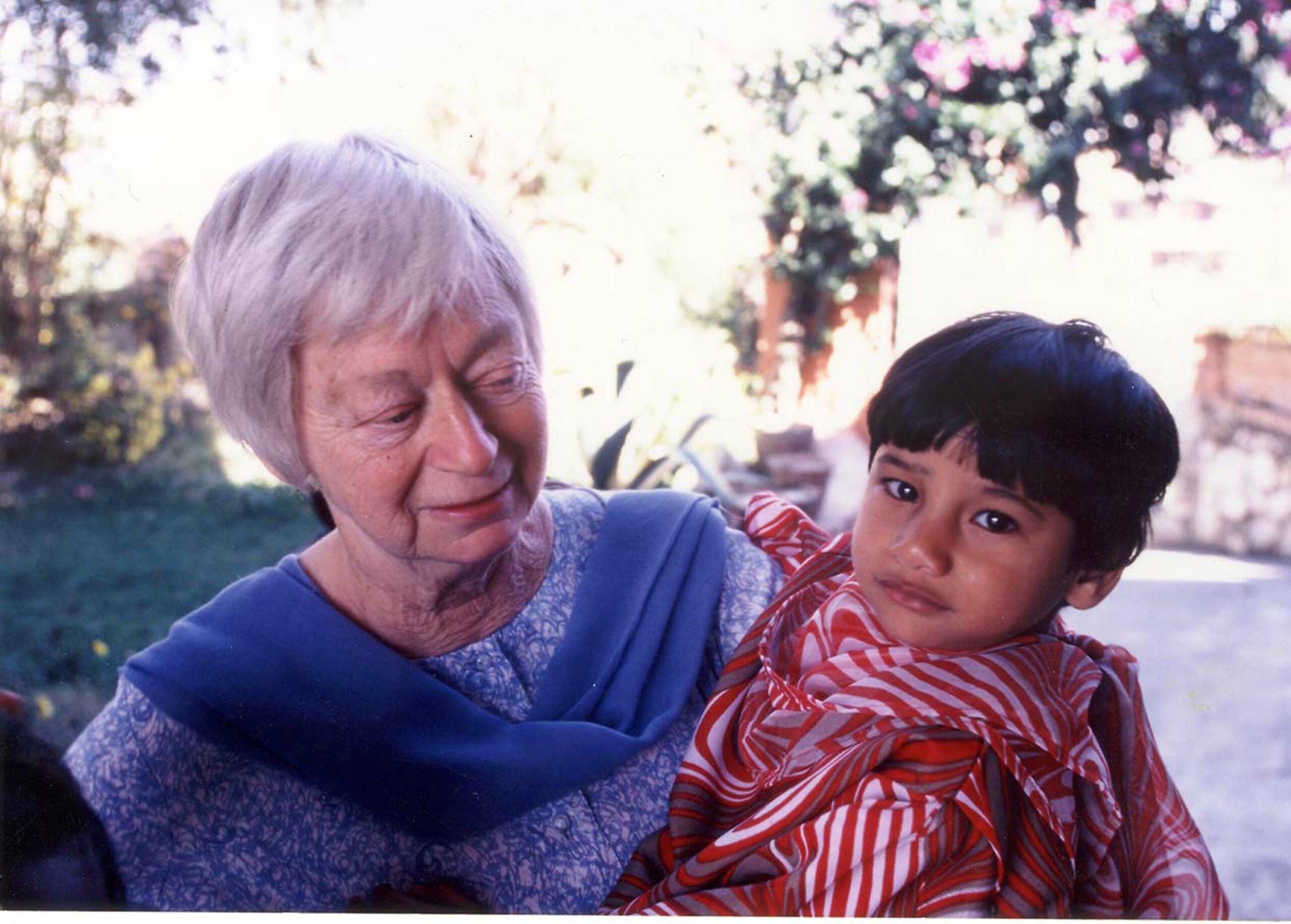
How to help us keep Olga’s promise
Olga’s Promise is a common phrase within the NYF Community—but with so many new friends among us, we’ve begun receiving questions about this important part of NYF’s fascinating history! Read on to learn all about Olga, her remarkable promise to Nepal’s children, and the work she defined as the most important of her life.
A Brief Biography: Olga Murray
Olga Murray had already led an extraordinary life before founding the Nepal Youth Foundation in 1990, in her 60s.
Born in the Transylvania region of Romania in 1925 to a Jewish Hungarian family, Olga and her family immigrated to the United States when she was only six.
Olga grew up in the Bronx during the Great Depression and World War II. She later recalled her parents’ ingenuity and resourcefulness as they navigated the economic hardships of the time, and their anxiety and heartache during World War II, when all contact with their families abruptly ceased. Olga’s father’s entire immediate family and her mother’s mother, brother, and several sisters were murdered during the Holocaust.
Olga graduated high school at age 16, only a month following the attack on Pearl Harbor. The prospect of college had not occurred to her as an option. Instead, she enrolled in a secretarial skills course, learning touch-typing, shorthand, and other office skills.
Then, at age 17, she embraced her innate wanderlust, boarding a train for exotic Los Angeles—the furthest she could travel during wartime. Olga spent the next years traveling the United States alone, supporting herself in tiny apartments while working clerical jobs, and taking in all the diversity and wonder she could find.
Soon, friends took notice of Olga’s sharp intellect, and began suggesting that she enter college. Olga did so, financing her educational journey by waitressing at night and earning a political science degree, cum laude, from Columbia University in 1949. She then applied for a job at the State Department, hoping to travel—but following a thorough FBI investigation, she was denied the opportunity because she had been born behind the Iron Curtain.
Social Justice & Early Career
The developing Cold War and Red Scare rhetoric deepened Olga’s interest in politics and social justice, and soon she secured a job working with the famed muckraking columnist Drew Pearson. She developed a passion for cutting through red tape and solving problems for ordinary citizens. She especially enjoyed leveraging the power of the press to advocate for oppressed people—a subject she was becoming increasingly focused on as the Civil Rights Movement got underway in the early 1950s.
Pearson, like so many others, took quick note of Olga’s tremendous potential, and her passion for advocacy. When Olga decided to risk pursuing a law degree—a subject that, in the early 1950s, was essentially unheard of for women—he encouraged her wholeheartedly, tweaking her working schedule to allow her to balance a full course load with her employment.
Olga earned her law degree at George Washington University in 1954, then moved to San Francisco to pursue a relationship with Judd Murray, the man who would be her husband from 1955 to 1961. She passed the California Bar Exam in late 1954 and was sworn into the California Bar soon thereafter—one of only six women in the entire cohort of hundreds.
The California Supreme Court
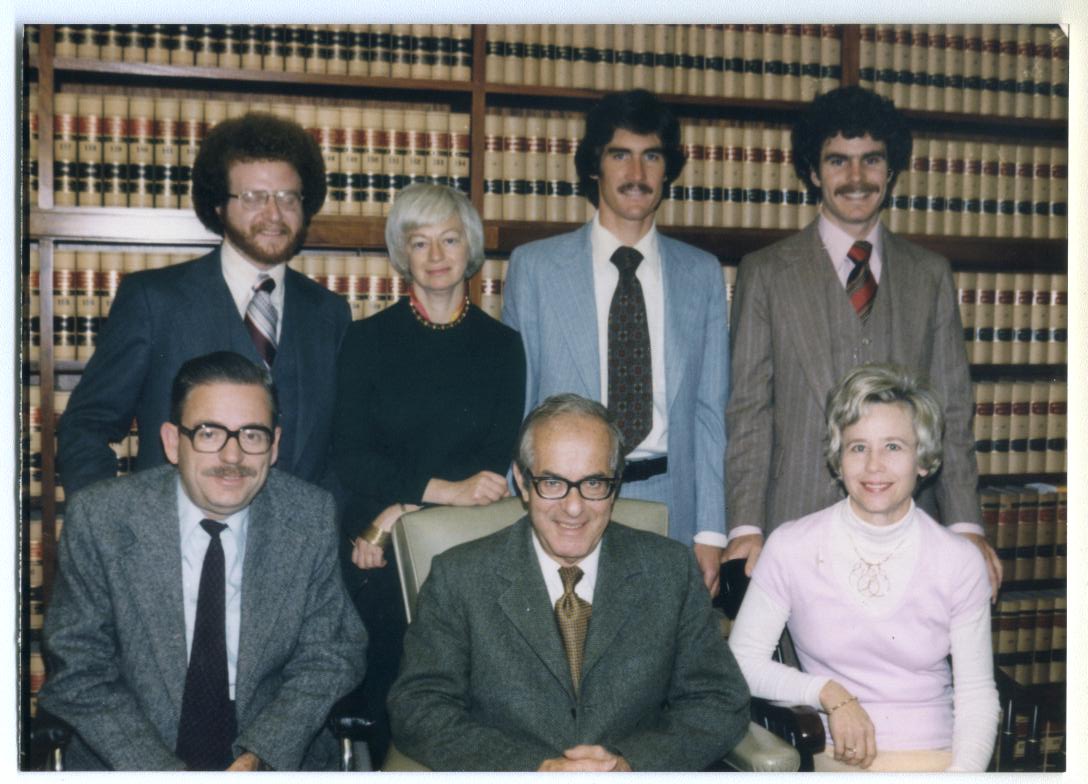
Against the odds, she soon secured a job working as a research attorney for Chief Justice Phil Gibson of the California Supreme Court—a position she held until his retirement in 1964. She then joined the staff of Associate Justice Stanley Mosk and remained at the California Supreme Court until 1992: the entire 37-year duration of her career. These decades saw the California Supreme Court pioneering many areas of law, developing new doctrines that were adopted by the high courts of other states. In her years as a research attorney, Olga helped write important decisions in the areas of civil rights, women’s rights, and environmental policy—work she took great pride in for the remainder of her life.
During this time, Olga traveled as often as possible, exploring Europe, Central America and any other destination that piqued her interest. In 1984, when Olga was 59, her lifelong wanderlust drew her to India—and Nepal.
Olga’s Promise
Olga’s first visit to Nepal was intended as a brief side trip. She knew nothing of the country other than that it was possible to trek in the beautiful Himalayas. Olga loved to hike.
She had no idea that this side trip would transform her life.
Embarking on a comparatively accessible trek from Pokhara, Olga passed through small, beautiful villages filled with friendly faces. With her white hair and slight build, Olga was different from the younger, more athletic trekkers who typically passed through. Once Olga’s openhearted, warm nature became apparent, children along the trail were eager to make friends, regardless of the language barrier. Olga later described them as “the most joyful, funny, amiable little kids anywhere on earth.”
Through her guides, Olga learned that the dearest wish of these children was to attend school. Very few rural Nepali children had access to education in those days.
An excerpt from her memoir “Olga’s Promise”:
“One evening, while camping near a hut on top of a small mountain, I was invited inside for a visit. Three young children were sitting on the dirt floor doing their homework by candlelight, their notebooks resting on a crude wooden plank that served as a desk. Their father and I were able to communicate through a few halting words in Nepali. His children were the lucky ones, he told me. Even though they walked two hours up and down the mountain to reach school every day, they were getting an education.
“Lying in my sleeping bag that night in the darkness of the tent, I suddenly knew—out of the blue, in a lightning moment—what I wanted to do with the rest of my life. Right then, I made a promise to myself that I would find a way to educate Nepali children.” Olga’s Promise, p. 30.
Olga had retirement on her mind, and though she knew she wanted to work with children after retiring, she was not clear how. Now, however, she realized that she wanted to make a positive difference in the lives of Nepali children. Undaunted as ever by the unknown, Olga threw herself into exploring the possibilities.
Nepal Youth Foundation
Olga began fulfilling her promise by personally providing college scholarships to a handful of young men on the brink of aging out of a Kathmandu orphanage. She reached out to her network of friends and loved ones, pleading for other students in similar circumstances. The work grew organically until, in 1990—two years before her retirement from law in 1992—Olga officially founded the Nepal Youth Foundation.
For the rest of her life, Olga spent half of almost every year living and working in Nepal.
Since its founding, NYF has helped over 60,000 Nepali children access scholarships, healthcare, freedom, shelter, and other empowering services—all without concern for caste, gender, disability, religious background, or other circumstance.
NYF was founded on Olga’s promise of education, but as her work got underway, Olga recognized other needs standing between Nepal’s children and a prosperous, empowered adulthood. Her mission grew organically, eventually incorporating interventions in nutritional health, family-style shelter, grassroots advocacy, and more.
Led by Nepali Experts
Olga earned the trust of the communities she served by privileging Nepali voices when designing and enacting solutions to identified problems. NYF proudly continues this approach today.
At the same time, Olga was wisely planning for NYF’s future. She realized that keeping her promise to Nepal’s children depended on Nepali leadership and expertise. In 2012, she named Som Paneru as her successor as NYF’s President, safeguarding the organization’s longevity.
Nepal’s tumultuous journey through recent decades saw Olga and NYF navigate Maoist insurgencies, royal ousters and massacres, the devastating 2015 earthquakes and their aftermath, the COVID-19 pandemic, and more. Olga’s love for the people of Nepal, coupled with the buy-in, expertise, wisdom, and enthusiasm of the Nepali people themselves, has improved the lives of thousands of children and their families. Nepal is already witnessing the butterfly effect in motion, as individuals who benefitted from Olga’s influence as children have become successful business owners, advocates, NGO leaders, engineers, teachers, doctors, and much more. The difference Olga’s promise has made in the country is truly incalculable, and it continues to expand from her initial investment in the future of a handful of boys in a Kathmandu orphanage.
You can explore NYF’s remarkable programming here.
Olga’s Promise is now Our Shared Promise
Olga passionately championed NYF’s work until her passing in February 2024, at age 98.
In the days ahead, the NYF Community is inspired to fulfill Olga’s promise to educate and empower Nepal’s children. Olga was always grateful to the NYF Community for sharing in this promise to empower Nepal’s children. She took great comfort (and pride!) in the knowledge that, thanks to friends like you, this remarkable work would continue well beyond her own extraordinary lifetime.
The Caste Equality Project—Our Most Ambitious Project Yet
In December 2022, during Olga’s last stay in Nepal, she and a team of NYF’s Nepali experts visited several Dalit-majority villages in Saptari District. Saptari District is a remote area of southeastern Nepal where casteism, systemic neglect, and other generational challenges have left families unable to leverage their incredible potential to build prosperity. Every shred of ingenuity, luck, sacrifice, hard work, and hope is focused on survival. And even these are often not enough.
“Dalit” castes are those that have historically been referred to as “untouchable.” Caste-based discrimination is illegal in Nepal, but in rural areas like Saptari District, access to legal recourse is rare. Many members of Dalit castes are not even aware that legal protections exist for them.
These communities will require a massive, intentional, multi-pronged offer of support in order to begin overcoming these challenges successfully and sustainably. For years, Olga and NYF have been eager to provide such support. In December 2022, following the worst of the COVID-19 pandemic, Olga was overjoyed to finally be getting this work underway.
Olga’s legacy lives on through the Caste Equality Project
Olga was 97 when she visited Saptari District, full of energy in her sturdy walking shoes. As has always been the case when she visited rural Nepal, locals expressed surprise at meeting a Westerner of such advanced age. They would have expected such a person to stick to more built-up areas of the country, where amenities and comforts were readily available. But it was important to Olga that she come personally to meet the communities NYF would be serving. Nepal is a country whose culture deeply respects elders—Olga’s presence among them, rather than comfortably bundled up someplace cozy, signaled that she, and the entire NYF Community, truly meant to help them.
“This is not a one- or two- or three- or four-year project,” Olga said, back in Kathmandu. “It could take 10, 20 years. But if NYF had a motto, it is, What we start, we finish. We’ll be there for the long haul for them. I just wish I could be around in 10 or 20 years to see the difference.”
Boldly encouraging and championing the launch of the Caste Equality Project was among the last major projects of Olga’s lifetime. She knew she was incredibly unlikely to see the end of it, but she also trusted the NYF staff and the NYF community to share her promise and see this work through to the end.
Join us now to help keep Olga’s promise
Are you as inspired by Olga’s promise to Nepal’s children as we are? You can help us honor Olga’s memory right now by providing support for the Caste Equality Project.
In the coming weeks, NYF is providing hundreds of Saptari District children with uniforms, school supplies, and transportation support. We are stocking school kitchens with fresh, high-quality, nutrient-rich ingredients to combat widespread malnutrition and encourage school attendance.
This is an exciting grassroots push, designed to show local governments how many school-aged children exist in Saptari District. It will also show how unprepared the existing school infrastructure is to accommodate them. Our team is making sure parents across the area understand the strategy. They’re also making sure parents are prepared for the long process of advocacy and activism.
Our work in Saptari District will empower the community to be the primary agents within this important movement—exactly how Olga would have done it.
You can support this incredible work right away by donating today.